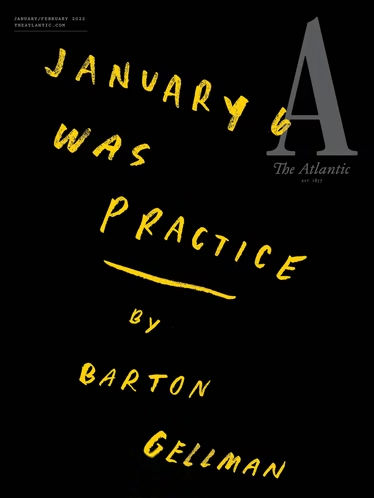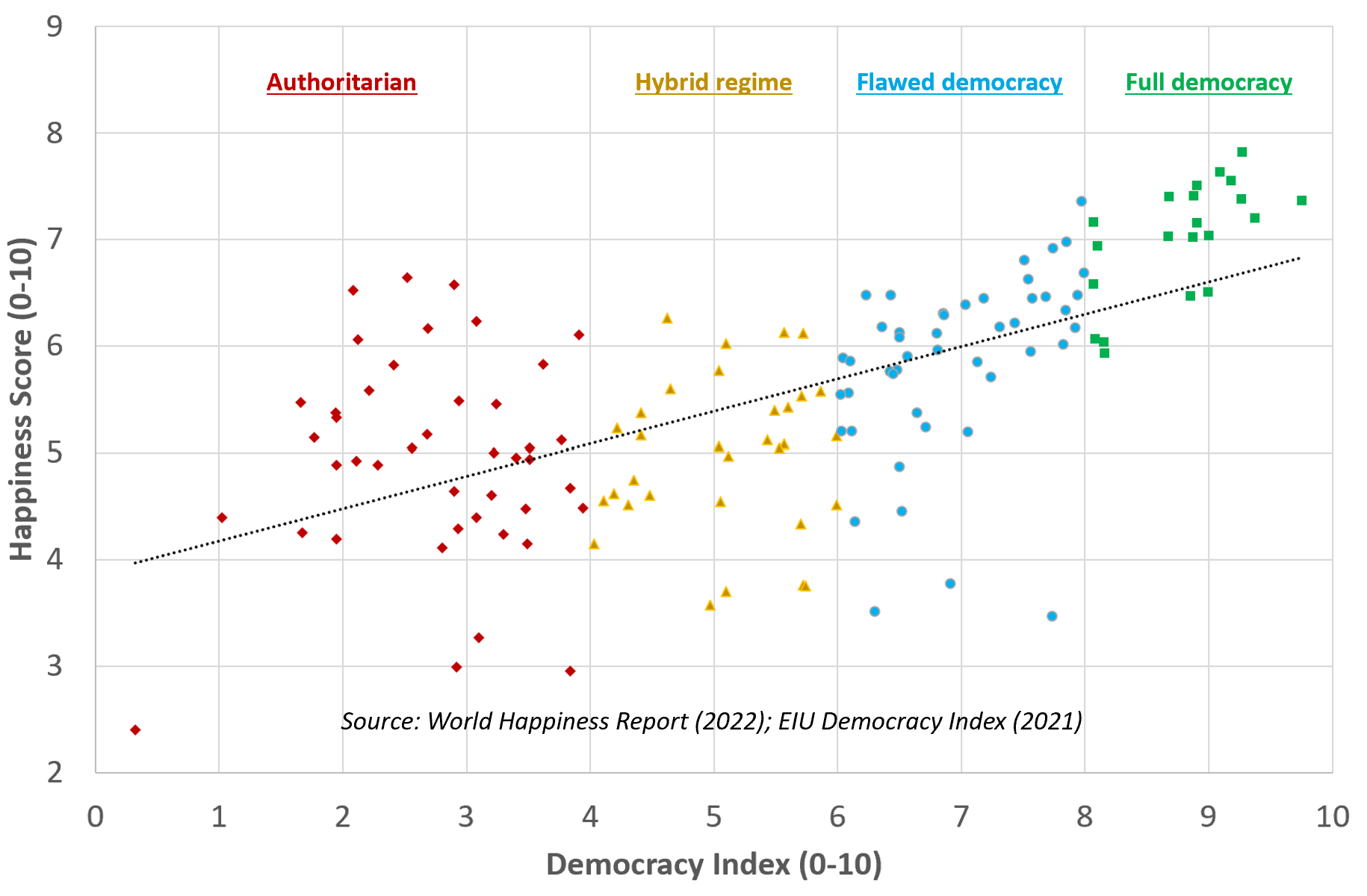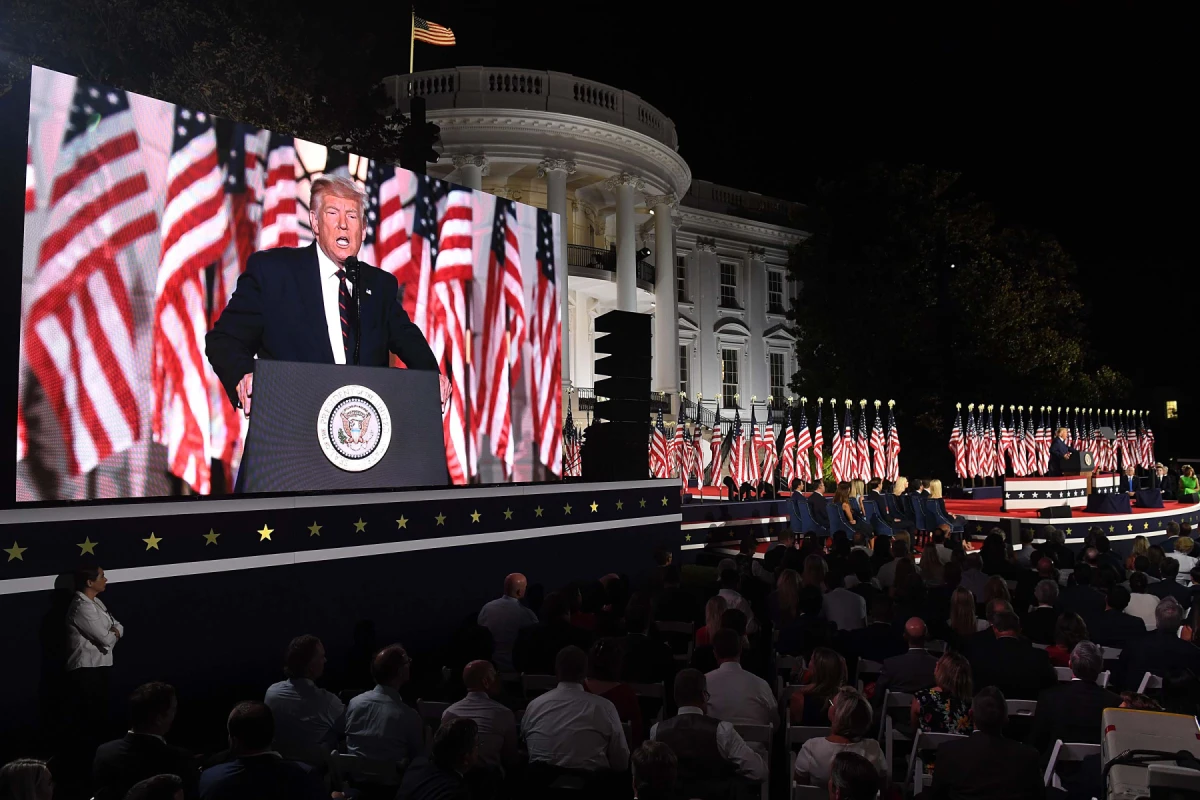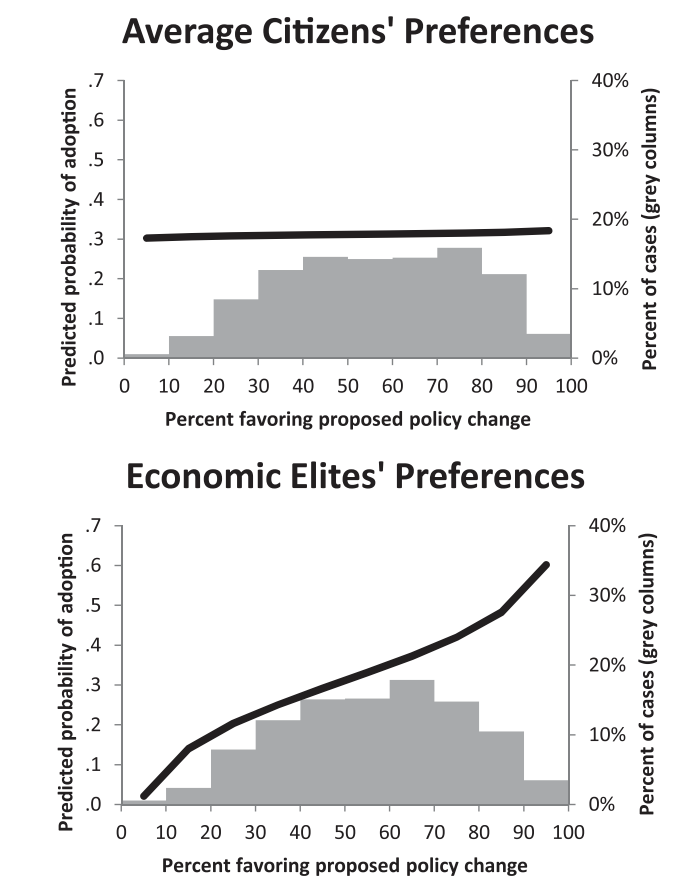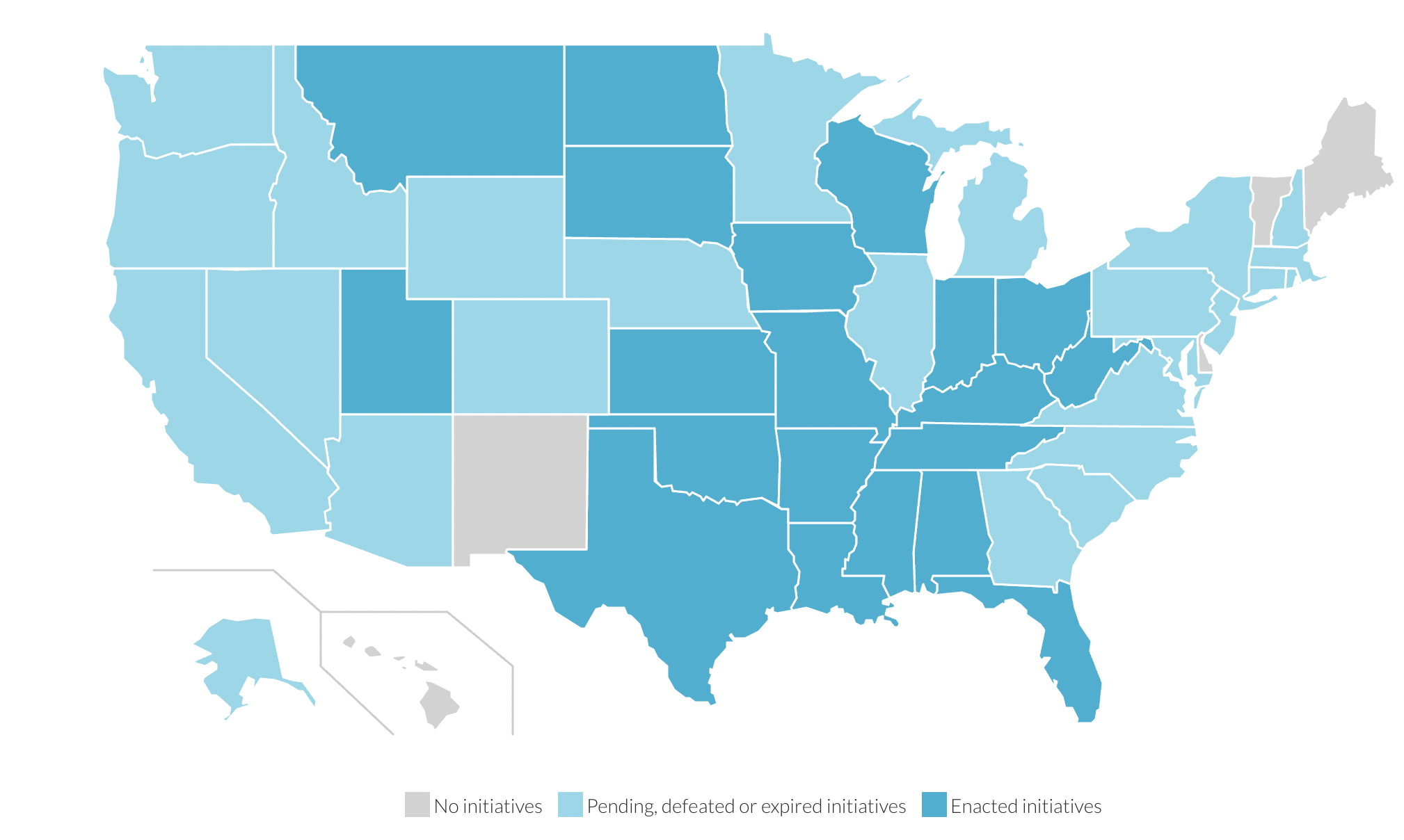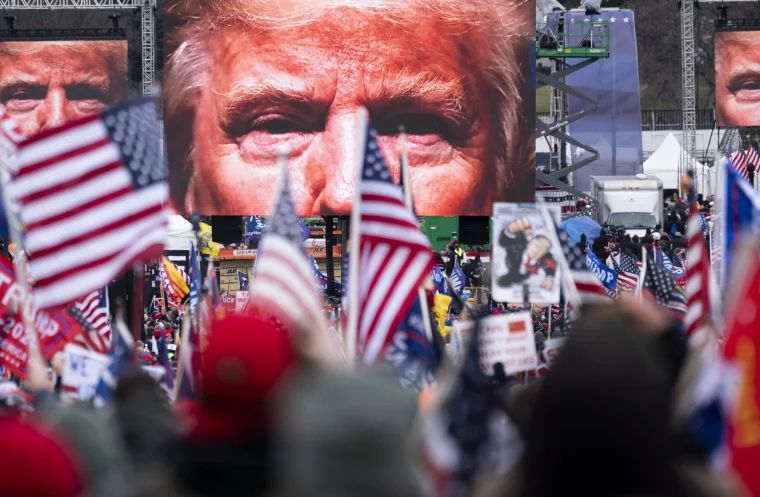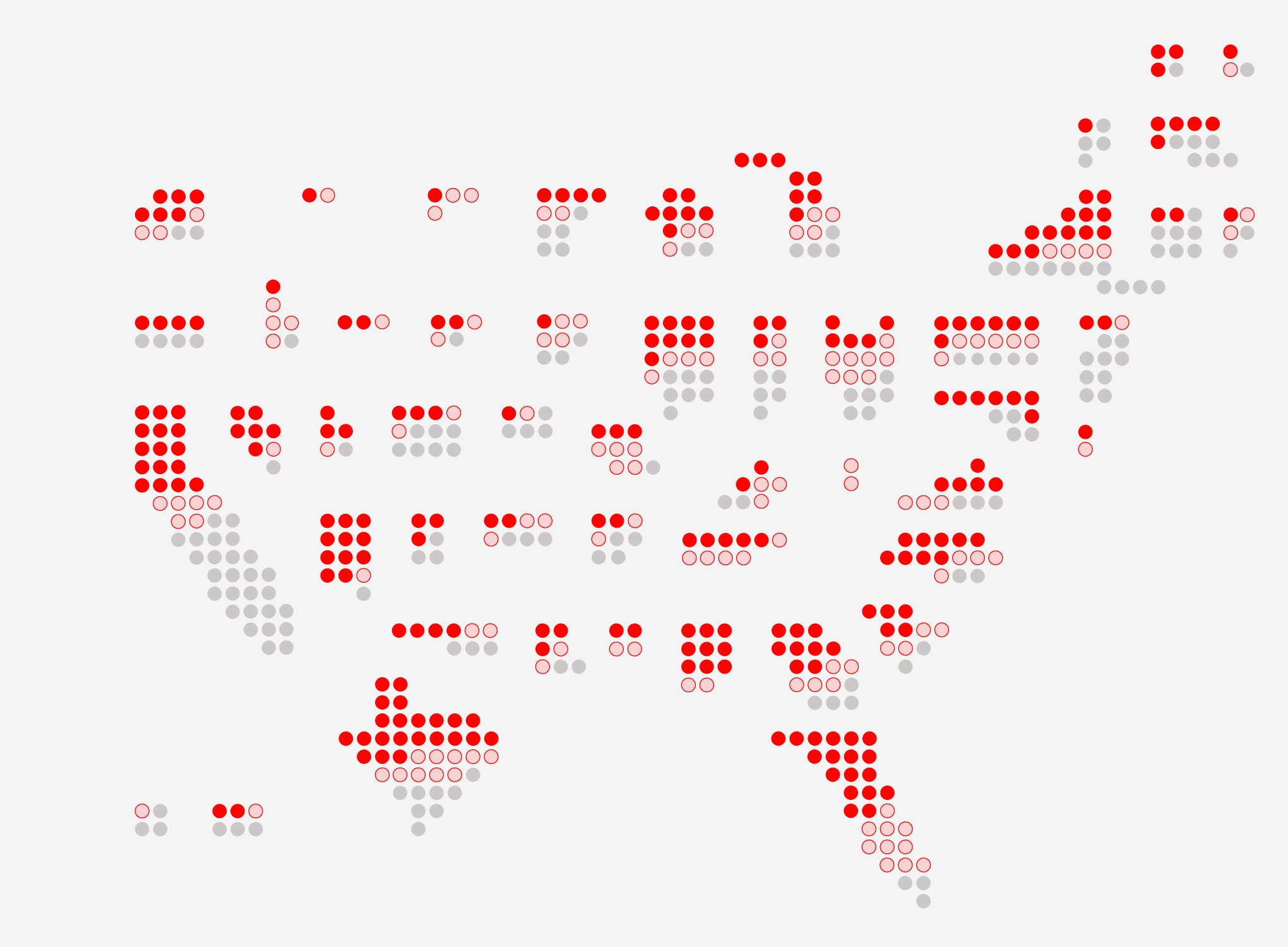Prospects for Democracy
by Jeremy Snyder
Last updated October 20, 2022
1. Introduction
There's been much discussion in traditional and social media for the potential that democracy may fail in the 2022-24 time frame. Minority rule may be locked in at the federal level for decades after that. (Fifty-nine million Americans in six states already live under minority rule at the state government level due to partisan gerrymandering.)
Because of these concerns, I've been reading books and articles and listening to podcasts on the topic. I put this website together to organize my thoughts, and hopefully to alert other people to the dangers we're facing. On this website, I have summarized:
- background on democracy.
- evidence that democracy in the U.S. is at very high risk of failing.
- The threat is from the whole Republican party, not just Trump.
My plan is to continue this work and also summarize:
- how we got to this point.
- what to expect if democracy fail.
- what we can do to save democracy.
- what we can do if democracy does fail.
- what a better federal government could look like.
I don't know exactly when I'll add the remaining material. Maybe not today. Maybe not tomorrow, but soon, because if authoritarianism takes root in the U.S., it will be in place for the rest of our lives.
In case you don't have time to read everything, I will start each section with key takeaways.
If you have any feedback, please reach out to me on Twitter @snarton.
2 Democracy
Before we start talking about the possible demise of American democracy, let's start with what it is.
If I had been asked for a definition of democracy before I started looking into this topic, I probably would have said something about voting for people to represent me in government, but I found out that there's more to it than that. I also found out that it's a recent and fragile form of government that's currently under threat around the world.
It's also an extraordinary form of government because it's the only way that we have discovered to manage the affairs of large groups of people while also allowing those people to maintain control of their own management.
If we lose our democracy, we'd then be under the control of whoever seizes power. You like your civil rights? Sorry. You think that the government should do something about inequality and climate change? Not likely. You want laws to be passed or operational decisions to be made in the best interest of the population? You'd better hope that these happen to align with the interests of the people in power.
As we'll talk about later, there are some groups of people who feel that they'd be better off with an authoritarian government: primarily white nationalists, Christian nationalists, and American oligarchs. Everyone else will be much worse off. If authoritarians were to take control of the government, it would probably take decades to reestablish democracy, so many people would spend the rest of their lives (and much of the lives of their children and grandchildren) under authoritarian control. Reclaiming democracy is typically violent.
Because of what's at stake, it's mystifying to me that more people aren't taking the risk of losing our democracy seriously.
- Democracy is relatively new and fragile. Many democracies have fallen to authoritarian regimes.
- Democracy is the only form of government to manage the business of large groups of citizens while the same citizens also collectively hold the power of the government.
- If democracy is lost, it's unlikely it would be regained within the lifetime of many readers. It's likely it would take bloodshed to regain it.
- Democracy uses laws to achieve three strategies: free and fair elections, good governance, and respecting citizens' rights.
- People who oppose democracy in the United States see the country belonging to white, Christian, and/or wealthy people, rather than being a nation of laws that apply to everyone equally.
- Academic studies have found that democracies provide greater happiness and health for their citizens, innovation, economic growth, safety, and eduction.
1.2 Democracy is very new and fragile.
Even though our species has existed for about 200,000 years, groups of humans larger than a tribe have lived together only since the Neolithic Revolution, about 12,000 years ago. Since then, almost everyone has lived under authoritarian rule, in which power is held by one or very few people. The first partial democracy, in which power was held by some citizens, didn't develop until 508 BCE in Athens. Other partial democracies existed sporadically until the short-lived Corsican Republic was established in 1755, implementing Enlightenment principles to form the first true democracy with universal suffrage. The first long-lived democracy was New Zealand in 1893.
Although the U.S. has considered itself a shining city on a hill for other countries to emulate, it wasn't a true democracy until the Voting Rights Act of 1965 allowed universal suffrage. We could even argue that the U.S. still has not achieved the status of a true democracy because the constitution allows for minority rule, such as via the electoral college and the senate.
The number of countries with democracies grew throughout the 20th century. Currently, Freedom House says that 84 countries have free citizens. However, one of the weaknesses of democracy is that they can be taken advantage of by rulers who want to seize power. Democracy failed in over 30 countries in the last century, and in some of those it failed multiple times. We are currently in a period of global democratic backsliding. In the past two decades, the number and quality of democracies have declined and an increasing fraction of the world population lives in countries undergoing autocratization.

1.3 What is democracy?
Democracy is an attempt to balance two conflicting goals. On one hand, we want citizens to be free to live their lives, pursue happiness, etc. On the other hand, we want to give a group of people the authority to make and enforce rules in order to maintain order within society, build infrastructure, organize our defenses, etc.
So how do we achieve this balance? Through three strategies:
- Free and fair elections. Collectively choosing who governs us. All adults are able to vote. Elections that don't restrict or pre-determine who can be elected. All votes count equally.
- Good governance. Both written laws and unwritten democratic norms ensure that elected officials are responsive to citizens' best interests. It doesn't do us any good to vote for representatives if they then turn around and are responsive to others for political, monetary, or safety reasons. We expect accountable elected officials. We expect that they hire qualified government employees and run the government in service to citizens. We impose terms (requiring that they stand for re-election periodically). Anti-corruption laws aim to support these goals. We deserve to be represented by respectable, trustworthy, ethical people.
- Respect for citizens' rights. Making sure that the government treats citizens fairly and respects their rights and liberties, no matter how much power or wealth they have. We put limits on the powers of elected officials by separating powers into multiple branches of government, making officials adhere to laws and regulations, and defining our rights and liberties in the constitution.
The crux of the threat to our democracy is a difference in what people consider The United States to be at its core. People in favor of democracy view us as a "nation of laws." Laws are passed to support the three strategies of democracy described above, are intended to make us all equals from the government's standpoint, and apply the same to every citizen. In contrast, people in favor of authoritarianism define the country based on groupings of people. They feel that this is a nation of white, Christian, and/or wealthy people. Sure, everyone can have a vote as long as those groups retain their power, but if their power is slipping it's more important to maintain control than to maintain democracy. They would argue that this is simply maintaining the true essence of the country, and the fact that it's self-serving is of no importance.
"If conservatives become convinced that they cannot win democratically, they will not abandon conservatism. They will reject democracy.”—David Frum
— Bill Kristol (@BillKristol) November 10, 2020
1.4 Forms of democracy
Democracy describes a process, not a single type of government. Democracy can take many forms. In direct democracies, citizens participate in decision making directly. The first partial democracy, in Athenia, used a lottery system to randomly select representatives of citizens for purposes of decision making. Today, most democracies are a representative form, in which citizens vote for representatives to make policy decisions. (There are many sub-types of representative democracies. The U.S. is a "federal presidential republic.")
1.5 Benefits of democracy
Given a choice between living in a democracy and authoritarian state, I'd pick democracy every time.
There's the obvious reasons: you have a say in how your government is run, your rights are protected, free and just society, etc. Authoritarian governments preserve power through repression. No thank you!
There are some follow-on benefits too:
- People who live in democracies are happier.
- People who live in democracies are healthier. A country transitioning to democracy increases life expectancy by 3% and decreases infant mortality by 94%. In contrast, autocratization leads to a decline in life expectancy.
- Democracies have better technology innovation.
- Democracies have better economic growth, resulting in 20% faster growth of GDP and protect against economic contraction.
- Democracies are less violent.
- Democracies provide more and better education. Studies have shown that democracies have 70% higher enrollment in secondary schools and spend 30% more on education.
- Democracies are more committed to climate change mitigation.
2 Democracy under attack
Our democracy may end within the next few years, with the U.S. under the control of an authoritarian regime.
What signs of this are we seeing? I'll discuss several overlapping areas of evidence:
- The 2021 Republican putsch to subvert the 2020 presidential vote.
- Republican plans to lock in minority rule starting with the 2024 election.
- Ongoing removal of the guardrails of democracy by Republicans.
- Republican affinity for authoritarian leaders of other countries.
- Republican use of fascist political tools.
- Academic and political experts say that Republicans are seeking authoritarianism.
- American democracy is under serious threat by the Republican Party. Evidence includes the attempt to steal the 2020 presidential election, current efforts in preparation for stealing future presidential elections, efforts over the past several decades to destroy the guardrails of democracy, a demonstrated affinity for authoritarian rulers around the world, and making use of the tools of fascism including stoking political violence.
- Authoritarianism frequently does not involve stealing elections through subversion. In modern times, authoritarian regimes are usually elected through democratic elections and then make changes to remain in power. Even if Republicans win the 2024 presidential election outright, I expect them to lock in their rule no matter the results of subsequent elections.
- Many political and academic experts have issued stark warnings that U.S. democracy is in peril and time is very short to avert the problem.
- While some of the efforts to lock in federal minority rule are linked with Trump, he is only one aspect of the problem. The push for authoritarianism is coming from most of the Republican Party.
2.1 2021 putsch
A strong signal that Republicans want to overthrow democracy is that they already attempted it in 2021. Rather than being remorseful, the party has doubled down on claiming that their actions were justified.
Joe Biden won the 2020 presidential election against Trump, both in the electoral college (306 to 232) and popular vote (81.3 million to 74.2 million). Trump and his Republican followers said that the election was stolen, but these claims were debunked by other Republicans immediately after the election by Trump's own Homeland Security officials and through dozens of court cases, several months after the election by Trump's Attorney General, William Barr, and in a rigorous later analysis by eight prominent Republicans.
Because Trump was not willing to accept an election loss no matter the results, he led three successive (but not successful) attempts to remain in power.

2.1.1 Plan A: The courts
Trump's first plan to steal the election was by asking the courts to give him the presidency by overturning the election. He thinks purely in terms of transactions: he installed many federal judges and the right-wing majority on the Supreme Court, so he expected them to look on his challenges favorably despite having no evidence of wrongdoing. He filed and lost over 60 lawsuits after the 2020 election challenging election processes, vote counting, and the vote certification process in swing states. Malcom Nance [p. 21] writes
All of the big lie lawsuits to stop the electors and get cases moving through what Trump was told was a friendly judiciary had one purpose: steal the election via the courts. With the help of Senate majority leader Mitch McConnell, Trump had filled the judiciary with an unprecedented 226 new judges. He held the record for the most federal appeals court judiciary appointments as well, putting 54 of them onto the bench. Since loyalty to Trump was a hallmark of anyone who was appointed to the bench, he assumed the judiciary was in his pocket. Additionally he had appointed 3 Supreme Court justices. Now he expected them to give him the 2020 election.
He wanted his cases to go through the judiciary quickly so they could specifically get into the hands of the Supreme Court. Trump spelled out this goal in a single tweet: "I easily WIN the presidency of the United States with LEGAL VOTES CAST," adding that "the OBSERVERS were not allowed, in any way, shape, or form, to do their job and therefore, votes excepted during this period must be determined to be ILLEGAL VOTES. US Supreme Court should decide!"
It was patently clear that Trump thought he had bought the Supreme Court and that they would overturn the election and give him the presidency. He then assumed that the three conservative justices he appointed would ignore the law because they owed him. Trump believed he had rigged the judicial system to do as he wanted. And this point to he was to be woefully disappointed.
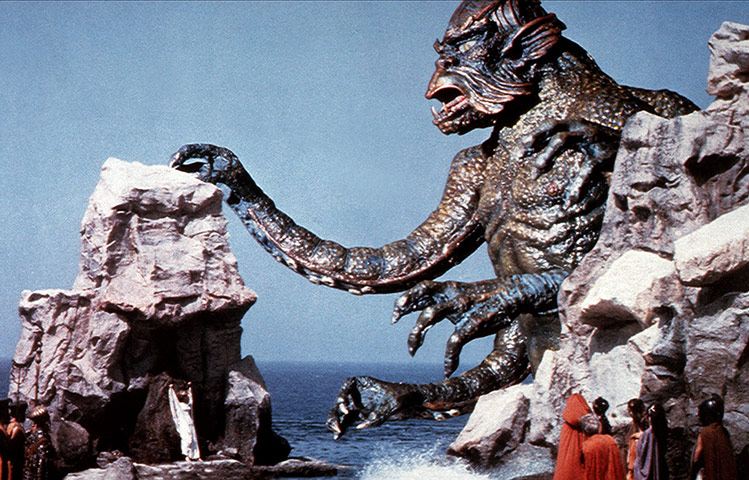
2.1.2 Plan B: Alternative electors
After Trump wasn't successful using the Supreme Court to steal the election, the second plan was to pressure Republican-led state legislatures in swing states to certify alternative slates of electors to the electoral college.
J. Michael Luttig explains:
The Electoral Count Act empowers Congress to decide the presidency in a host of circumstances where Congress determines that state electoral votes were not “regularly given” by electors who were “lawfully certified,” terms that are undefined and ambiguous. In this ... stage of the plan, the Republicans needed to generate state-certified alternative slates of electors from swing states where Biden won the popular vote who would cast their electoral votes for Trump instead.
The memo that John Eastman wrote for Trump says that the plan was for Pence to announce that "because of the ongoing disputes in the 7 States [with alternate slates of electors], there are no electors that can be deemed validly appointed in those States." In that case, neither Biden nor Trump would have the requisite 270 votes to win the presidency. In this situation, the Twelfth Amendment to the U.S. Constitution calls for each state delegation in the House of Representatives to cast one vote for president. Because there are more red states than blue states in the House (even though there are more Democratic representatives), Trump would have been declared the president.
Luttig continues:
"The Republicans' plan failed at this stage when they were unable to secure a single legitimate, alternative slate of electors from any state because the various state officials refused to officially certify these Trump-urged slates."
[F]oiled by their inability to come up with alternative state electoral slates..., and with time running out, Trump and the Republicans... [tried] to scare up illegitimate alternative electoral slates in various swing states to be transmitted to Congress.
The entire house of cards collapsed at noon on January 6, when Pence refused to go along with the ill-conceived plan, correctly concluding that under the 12th Amendment he had no power to reject the votes that had been cast by the duly certified electors or to delay the count to give Republicans even more time to whip up alternative electoral slates.
Recommended reading:
The Republican plan to subvert the 2020 and 2024 elections is described in a concise op-ed written by Republican lawyer J. Michael Luttig. He has was appointed by President George H. W. Bush and served on the US Court of Appeals for the Fourth Circuit (with 33 of his clerks going on to clerk for Justices Thomas or Scalia), advised Vice President Mike Pence on Jan. 6, and testified at the House Jan. 6 hearings.
2.1.3 Plan C: Violent overthrow
We don't yet have the full story of the Jan. 6 attack on the Capitol. Information from the House Select Committee on the January 6 Attack has provided us with a partial picture of what happened. What we do know indicates that:
Trump and his allies planned the attack ahead of Jan. 6.
- Significant planning and fundraising was conducted ahead of Jan. 6.
- Trump's Dec. 19, 2020 tweet saying that the protest "will be wild" was a signal to his base that violence was planned.
- Trump's associates such as Roger Stone and Michael Flynn were in close communication with right-wing militias in attendance including the Oath Keepers, the Three Percenters, and the Proud Boys. The militias used the larger mob of Trump supporters as a screen, entering the Capitol only after the larger mob had broken in.
- It appears that Chuck Grassley (R-IA) knew what to expect. On Jan. 5, he said "if the Vice President isn't there and we don't expect him to be there, I will be presiding over the Senate." Grassley was president pro tempore of the Senate at the time and would preside in the case of Pence's absence.
The insurrection was intended to be violent.
- The night before, pipe bombs were placed near the Democratic and Republican National Committee headquarters.
- Trump knew that the crowd that had assembled to watch him speak at the Ellipse was armed and encouraged them to march to the Capitol.
The likely goal of the insurrection was to disrupt the transfer of power.
- The insurrectionists were looking for the Electoral College ballots. If the ballots had been destroyed, the vote to certify the election would have been delayed.
- Despite pleading from Republican leadership, Trump refused to call off the attack, letting it continue for hours.
- During the attack, the Capitol Police requested backup from the National Guard, but the requests were denied. Trump's acting Defense Secretary had sent a memo two days prior requiring his personal authorization for deployment.
- Trump finally called off the insurrection after learning that Mike Pence had authorized the deployment of the National Guard, meaning that the insurrection had failed.
- The Oath Keepers militia had prepared a cache of weapons and supplies to last 30 days at a location near the Capitol, indicating that they expected a long-lasting seige of the building.
- Trump wanted to personally lead the mob from the Ellipse to the Capitol, in the manner of Mussolini leading his blackshirts to Rome.
It's also possible Trump had no post-insurrection plan. As Ruth Ben-Ghiat writes [p.252]:
Although we often hear that strongmen are genius strategists, few if any, of them had a master plan for their rule. Their real talents are those of the street fighter and the con man rather than the chess master: quickness at making the most of the opportunities offered to them, skill at getting people to bond with them and believe their fictions, and a willingness to do anything necessary to get the absolute authority they crave.
The Capitol Police managed to keep congress members safe that day, and they reconvened later that night, certifying Biden as the president at 3:24 AM. But what if the violent attack had been successful? Trump's goal isn't (yet) known. Some personal speculation of what Trump may have had in mind:
- Congress can pass legislation to give themselves more time to certify the election after Jan. 6, but if neither the vote certification nor delaying legislation was passed in time, then Trump may have wanted to use this uncertainty to claim the presidency.
- If there was sufficient violence/death in the Capitol, he may have wanted to declare martial law, suspend the constitution, and declare himself president. Trump had discussed having the military "rerun" the presidential election in swing states, which would fit with this plan.
- The insurrectionists seemed to be hunting for both Nancy Pelosi and Mike Pence. If both had been killed, the next in the line of presidential succession would have been Republican Senator Chuck Grassley of Iowa, who no doubt would have been open to encouragement to let Trump remain president.
There was and remains widespread support among Republicans for the insurrection.
- Despite the violent attack only hours earlier, 147 Republican congress members still objected to the certification of the election results on Jan. 6, though they had no legitimate reason to do so.
- When Trump was impeached for leading the insurrection, 197 of 211 Republican representatives and 43 of 50 Republican senators voted against impeachment.
- As of June 2022, 61% of Republicans say that the Jan. 6 insurrection was a "legitimate protest."
The Republican's attempt to subvert the previous election through both legal and violent means is evidence of their willingness to impose authoritarianism in the future. As Adam Kinzinger (R-IL) said,
“The forces Donald Trump ignited that day have not gone away. The militant, intolerant ideologies, the militias, the alienation, and the disaffection. The weird fantasies and disinformation. They're all still out there, ready to go."
2.2 Preparations to steal future elections
Although their 2021 attempt to illegitimately hold presidential power failed, Republicans are actively working on how to hold onto power in 2024 and beyond, no matter the will of the American people.
2.2.1 Independent State Legislature Doctrine
Who decides the electors to the electoral college? The U.S. Constitution says that
Each State shall appoint, in such Manner as the Legislature thereof may direct, a Number of Electors, equal to the whole Number of Senators and Representatives to which the State may be entitled in the Congress....
Unlike the procedures for choosing Senators and Representatives, the constitution gives the federal government no role in setting procedures for choosing presidential electors. Early in American history, state legislatures chose the electors themselves in most states, and it wasn't until 1864 that all states chose electors by popular vote.
Could a state legislature choose to not hold a popular election directly appoint a slate of electors? Currently, presidential elections are written into state laws, but state government could change this law at any time. This is not a likely course of action, though, because citizens in every state expect to be able to vote for president.
Could a state government hold a popular election for president, but then appoint a slate of electors themselves? Probably yes in all states, and definitely yes in some states. This might be needed if, say, a natural disaster prevents the completion of an election or the counting of the ballots. A North Carolina statue, for example, says that if the counting of ballots isn't completed by a certain time, then its state General Assembly will appoint electors. This hasn't been tested yet in any with or without a relevant state law, but, it almost happened in Florida in 2000 due to hanging chads in Palm Beach County:
In 2000, as disputes over the presidential election wound their way through the courts, the Florida House of Representatives voted to appoint a slate of Republican electors to support then-candidate George W. Bush. The legislature did not proceed with the plan because the U.S. Supreme Court ruled in Bush's favor before the Florida Senate had the opportunity to consider the issue.
The potential for a state legislature to act due to a delay provides a mechanism by which a partisan secretary of state could throw an election, such as by artificially creating delays in ballot counting through excessive audits.
- Brennan Center for Justice's The "Independent State Legislature Theory," Explained
- Fordham Law Review's "The Independent State Legislature Doctrine," pp. 542-546.
Could a state government hold a popular election for president, but then appoint a slate of electors themselves, even when there's no cause of a delay like a natural disaster? Because of, because of... fraud. Yeah, fraud. Just like in the 2020 election. Yeah, that's the ticket.
A radical legal theory called the Independent State Legislature Doctrine advanced by Republicans in the last two decades says "sure you can- it says right there in the constitution in black-and-sepia that the state legislature can appoint electors in whatever manner they want." As the Brennan Center for Justice notes:
The dispute hinges on how to understand the word “legislature.” The long-running understanding is that it refers to each state’s general lawmaking processes, including all the normal procedures and limitations.
In June 2022, the Supreme Court said that they will review the Independent State Legislature Doctrine in their next term in the case Moore v. Harper. Conservative lawyer J. Michael Luttig predicts that Repbulicans
will likely win the independent state legislature doctrine, now that Amy Coney Barrett is on the Court and ready to vote. Barrett has not addressed the issue, but this turns on an originalist interpretation of the Constitution, and Barrett is firmly aligned on that method of constitutional interpretation with Thomas, Alito, and Gorsuch, all three of whom have written that they believe the doctrine is correct.
The Moore v. Harper case focuses on another aspect of the independent state legislature doctrine, regarding if state legislatures have absolute power to gerrymander congressional districts. Their ruling may be wide enough to speak to legislatures appointing presidential electors directly.
The independent state legislature doctrine could come to a head in the 2024 election because out of 13 presidential election swing/battleground states, Republicans hold control over both houses of the state legislature in 11 of them, often due to extreme gerrymandering:
- Arizona
- Florida
- Georgia
- Iowa
- Michigan
- New Hampshire
- North Carolina
- Ohio
- Pennsylvania
- Texas
- Wisconsin
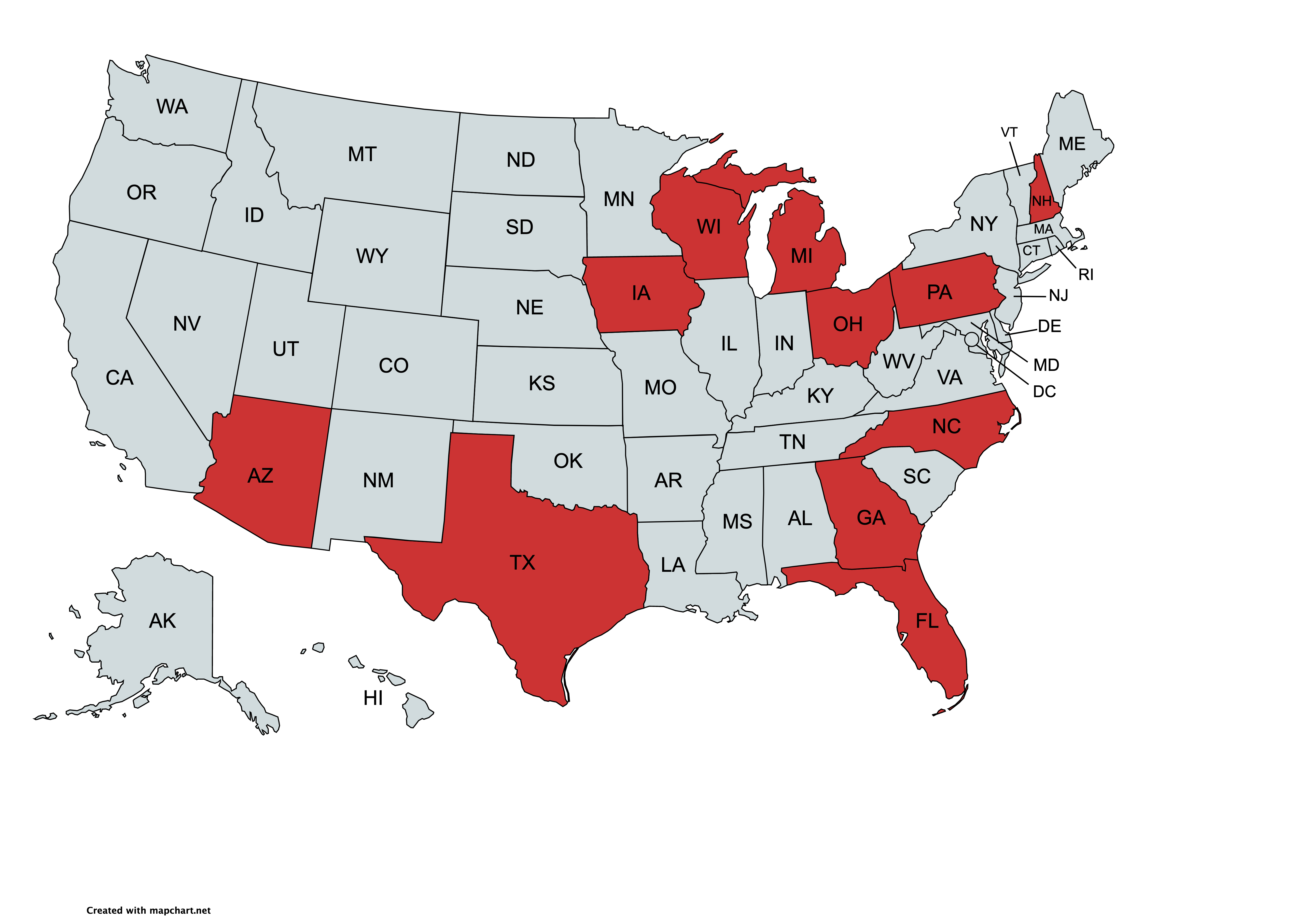
1/ The Nightmare Scenario SCOTUS is Plotting For the 2024 Election Takeover:
— Thom Hartmann (@Thom_Hartmann) July 2, 2022
2.2.2 Election subversion
The plans to overturn the 2020 election involved "alternative" slates of presidential electors (the people who vote in the electoral college), but these efforts were stymied by state election officials who put their country before their party. Republicans are using several techniques to reduce the likelihood that election officials will stand in their way in future elections.
One technique is the passage of laws that make it easier for political parties to interfere in elections. According to the Brennan Center:
Election interference laws do two primary things. They open the door to partisan interference in elections, or they threaten the people and processes that make elections work. In many cases, these efforts are being justified as measures to combat baseless claims of widespread voter fraud and a stolen 2020 election....
Between January 1 and May 4, [2022] six states (Alabama, Arizona, Florida, Georgia, Kentucky, and Oklahoma) have enacted nine election interference laws. As of May 4, at least 17 election interference bills are moving through five state legislatures. Overall, lawmakers in 27 states have introduced at least 148 election interference bills in the 2022 legislative session.
Election subversion is the interference in an election to subvert the will of citizens by overturning the popular vote.
In addition to new election interference laws, Republicans are also putting in place people who are more willing to interfere with elections. They are "seeking to replace officials across the nation, including volunteer poll watchers, paid precinct judges, elected county clerks and state attorneys general..." who are integral to the process of appointing presidential electors.
To put partisan election workers in place, they are first getting long-time election administrators to quit through threats of violence, fines, and jail time.
Second, they are campaigning for new secretaries of state and other election administrators who support Trump's Big Lie. There are several ways that secretaries of state can interfere with election results including:
- conducting endless audits
- refusing to accommodate voters due to unforeseen circumstances
- acquiescing to political pressure to produce favorable results
As conservative judge J. Michael Luttig puts it:
The Republicans are... in the throes of electing Trump-endorsed candidates to state legislative offices in key swing states, installing into office their favored state election officials who deny that Biden won the 2020 election, such as secretaries of state, electing sympathetic state court judges onto the state benches and grooming their preferred potential electors for ultimate selection by the party, all so they will be positioned to generate and transmit alternative electoral slates to Congress, if need be.
Third, Republican leader and far-right nationalist Steve Bannon is pushing for a takeover of the election process from the bottom-up, called his "precinct strategy".
The solution, Bannon announced, was to seize control of the GOP from the bottom up. Listeners should flood into the lowest rung of the party structure: the precincts. “It’s going to be a fight, but this is a fight that must be won, we don’t have an option,” Bannon said on his show in May. “We’re going to take this back village by village … precinct by precinct.” Precinct officers are the worker bees of political parties, typically responsible for routine tasks like making phone calls or knocking on doors. But collectively, they can influence how elections are run. In some states, they have a say in choosing poll workers, and in others they help pick members of boards that oversee elections. After Bannon’s endorsement, the “precinct strategy” rocketed across far-right media. Viral posts promoting the plan racked up millions of views on pro-Trump websites, talk radio, fringe social networks and message boards, and programs aligned with the QAnon conspiracy theory. Suddenly, people who had never before showed interest in party politics started calling the local GOP headquarters or crowding into county conventions, eager to enlist as precinct officers. They showed up in states Trump won and in states he lost, in deep-red rural areas, in swing-voting suburbs and in populous cities.
We've already gotten a taste of what to expect from partisan control over election results in one New Mexico primary in January 2022.
"[I]n a safely red corner of the map, Couy Griffin, the county commissioner from Otero County, N.M., and founder of Cowboys for Trump, embarked on a bold experiment in election nullification at the local level.... all three commissioners refused to certify the county’s 2022 results on the grounds that the 2020 issues remained unaddressed.... Maggie Toulouse Oliver, New Mexico’s Democratic secretary of state, sued the county commissioners, and the State Supreme Court ordered the commission to certify that election. Griffin’s two co-commissioners relented, voting to certify the election, but Griffin himself remained unmoved. “It’s not based on any facts,” he told his colleagues. “It’s only based on my gut feeling and my own intuition, and that’s all I need.”"
Johnny Harris provides a summary of election subversion in a New York Times opinion video.
Imagine the scenario where it's not just one random election denier in rural New Mexico, but election deniers just like him all over the country in key counties and states at every level of the state certifying process. Imagine if the secretary of state of New Mexico hadn't been a Democrat, but a pro-Trump Republican who indulged this guy's gut feeling about the voting. Oh, and now pair that with [Steve Bannon's] precinct strategy. And instead of one guy's gut feeling and intuition, it's now an army of election workers and election monitors who actually have been documenting and reporting a bunch of perceived instances of voter fraud. Their fleet of lawyers cataloging their affidavits, their reports, all in a growing body of evidence, and suddenly, the entire system has been infiltrated. A perfectly free and fair election could be called into question because this system that was never built to withstand the stress of aggressive partisan bad actors has been taken over with people bent on revenge placed strategically at every level, all with a mission to re-rig the system and avenge what they believe was stolen from them [in 2020].

University of Michigan professor of political science Nicholas Valentino told New York Times columnist Thomas Edsall that voter subversion would be a marker of the end of democracy in the US.
We will need to see what happens in 2022 and 2024, but two types of events in these upcoming elections would indicate whether the U.S. has broken from mainstream democratic systems.
First, widespread refusal among losing candidates and members of their party to accept their losses in these elections and, second, state officials in certain states refusing to certify elections where candidates of their own party lose.... This would be voter nullification after the fact.
2.2.3 Voter suppression
Voter subversion efforts, which announce to the world that they are an authoritarian regime, won't be needed if Republicans win elections through voter suppression, which tends to fly under the radar.
It all starts with not letting too many of the “wrong” people vote. That's why Republican lawmakers are introducing hundreds of bills intended to make voting more difficult, and have enacted such laws almost everywhere they are in charge. All of these voter suppression laws are ostensibly race-neutral and non-partisan. But they are designed to have a disproportionate effect on voters of color, or on young people - on groups that tend to vote Democratic. If too many of the “wrong” people are still voting, Republicans want to make their electoral choices count less. Gerrymandering is one way they are trying to achieve that goal, and it has been radicalizing basically wherever the GOP is in charge.
According to the Brennan Center:
As of May 4, [2022] at least 34 bills with restrictive provisions are moving through 11 state legislatures. Overall, lawmakers in 39 states have considered at least 393 restrictive bills for the 2022 legislative session. Since the beginning of 2021, 18 states have passed 34 restrictive voting laws, which can disproportionately affect voters of color.
Republicans are advancing these bills despite no widespread voter fraud.
Voter suppression proved successful since the Jim Crow era in preventing minorities from voting. Following the Supreme Court's 2013 gutting of 1965 Voting Rights Act, there is no legal impediment to Republican voter suppression.
Voter suppression methods include:
- Closing polling places to make it more difficult to access a polling place and ensuring long lines.
- Making it difficult to wait in voting lines, such as prohibiting the handing out of food and water.
- Voter roll purges.
- Requiring voter ID for mail ballots
- Restrictions on voting by mail
- Restrictions return of mail ballots
- Efforts to make voter registration harder
- Creating an "army" of poll watchers to intimidate minority voters.
- Threatening election administrators who help people vote with jail time.

In Arizona, the far-right paramilitary group, Lions of Liberty, launched what they're calling "Operation: Drop Box." With the help of a supportive sheriff, they "plan on watching the ballot boxes throughout Yavapai County." pic.twitter.com/lz7FvrTRxC
— Devin Burghart (@dburghart) September 23, 2022
2.3 Destroying guardrails of democracy
I used to think democracy was like a sport. Each election is like a match between a blue team (yea!) and a red team (booo!).
To paraphrase Mitch Hedberg, I still do, but I used to too. What was wrong about my earlier thinking, though, was that I thought about us citizens as just the players on the teams. The novel thing about democracy is that not only do we play the game, but we set our own rules and enforce them too.
So we're more like a self-organized sports league than just players. We have specific rules that govern game play (laws and regulations), rules about changing the rules (legislative process), and even rules about how to change the rules about how to change the rules (constitutional amendments). We set up the league and keep playing because we decided that it would be to our collective benefit.
Authoritarianism is when the red team feels that they deserve to win every game. As mentioned earlier, many democracies have failed before, so there are a number of strategies the red team (the Republicans- were you able to guess?) can choose from.
To torture the sports analogy a little more, the red players would be in a more stable position if the blue players thought the league was still intact, so they used all their time to practice their skills and play the games under the old rules, even if they never won any. If too many people on the blue team were to catch wind of what's going on, they might put up a fight or take their ball and go home.
2.3.1 Erosion of democracy
According to Profs. Steven Levitsky and Daniel Ziblatt of Harvard in their book How Democracies Die:
Blatant dictatorship- in the form of fascism, communism, or military rule- has disappeared across much of the world. Military coups and other violent seizures of power are rare. Most countries hold regular elections. Democracies still die, but by different means. Since the end of the Cold War, most democratic breakdowns have been caused not by generals and soldiers but by elected governments themselves.... Democratic backsliding today begins at the ballot box.
The electoral road to breakdown is dangerously deceptive. With a classic coup d'état, as in Pinochet's Chile, the death of a democracy is immediate and evident to all. The presidential palace burns. The president is killed, imprisoned, or shipped off into exile. The constitution is suspended or scrapped. On the electoral road, none of these things happen. There are no tanks in the streets. Constitutions and other nominally democratic institutions remain in place. People still vote. Elected autocrats maintain a veneer of democracy while eviscerating its substance.
Many government efforts to subvert democracy are "legal," in the sense that they are approved by the legislature or accepted by the courts.... Newspapers still publish but are bought off or bullied into self-censorship. Citizens continue to criticize the government but often find themselves facing tax or other legal troubles. This sows public confusion. People do not immediately realize what is happening. Many continue to believe they are living in a democracy....
Because there is no single moment- no coup, declaration of martial law, or suspension of the constitution- in which the regime obviously "crosses the line" into dictatorship, nothing may set off society's alarm bells. Those who denounce government abuse may be dismissed as exaggerating or crying wolf. Democracy's erosion is, for many, almost imperceptible.
Recommended reading
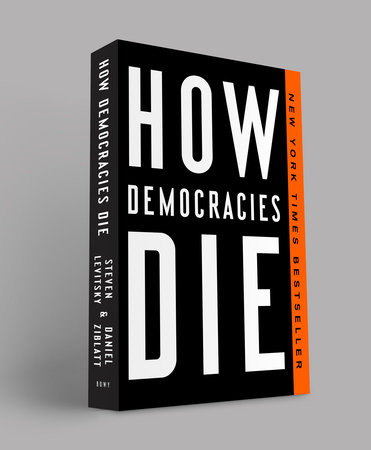
Democracies that failed through elected leaders using legal procedures to transition the government to authoritarianism include:
- Georgia
- Germany (Hitler)
- Hungary (Orbán)
- Nicaragua (Ortega)
- Peru (Fujimori)
- Philippines (Duterte)
- Poland
- Russia (Putin)
- Sri Lanka (Rajapaksa)
- Turkey (Erdogan)
- Ukraine (Yanukovych)
- Venezuela (Chavez)
According to Ruth Ben-Ghiat [p. 49]
[N]ew authoritarians use elections to keep themselves in office, deploying antidemocratic tactics like fraud or voter suppression to get the results they need.... Leaders who come to power by elections rather than coups are more likely to avoid ejection from office and less likely to face punishment.
Levitsky and Ziblatt say [pp. 101-3] it's not just a democratic country's constitution or laws that keeps it a democracy, it's also the unwritten rules of the game.
These rules or norms serve as the soft guardrails of democracy, preventing day-to-day political competition from devolving into a no-holds-barred conflict. [Norms] do not simply rely on a political leaders' good character, but rather are shared codes of conduct that become common knowledge within a particular community or society- accepted, respected, and enforced by its members....
Unwritten rules are everywhere in American politics, ranging from the operations of the Senate and the Electoral College to the format of presidential press conferences. But two norms stand out as fundamental to a functioning democracy: mutual toleration and institutional forbearance.
Mutual toleration refers to the idea that as long as our rivals play by constitutional rules, we accept that they have an equal right to exist, compete for power, and govern. We may disagree with, and even strongly dislike, our rivals, but we nevertheless accept them as legitimate.... Put another way, mutual toleration is politicians' collective willingness to agree to disagree....
Forbearance means... "restraining from exercising a legal right." [It] can be thought of as avoiding actions that, while respecting the letter of the law, obviously violate its spirit....
In a pickup basketball game, we play aggressively, we we know not to foul excessively- and to call a foul only when it is egregious. After all, you show up toe the park to play a basketball game, not to fight. In politics, this often means eschewing dirty tricks or hardball tactics in the name of civility and fair play.

Democratic norms are the guardrails that keep our pickup basketball game from running off the road and devolving into a street fight, but they are currently eroding like sedimentary rock being washed away by the runoff of the Republican party. Metaphorically speaking.
In other words, the erosion of democracy isn't just the result of an authoritarian takeover, it's part of the typical process in modern history. Therefore, the weakening of a democracy can be evidence of its impending failure. In addition to an authoritarian leader or party deliberately weakening democracy for their own gains, an unintentional weakening makes the population more receptive to authoritarian rule because they feel the current government is no longer working in their best interests.

Because the erosion of democracy is a potent warning sign, we'll look at four areas of evidence that it's happening in the U.S. recently. First, we'll look at examples in the three aspects of democracy we discussed above:
- free and fair elections
- accountable government officials
- respect for citizens' rights
Then, we'll look at worldwide ratings of democracies.
Other aspects of the erosion of democracy relate directly to fascism, and are discussed in that section, below.
2.3.2 Erosion of free and fair elections
Free and fair elections are one of the bedrock principles of democracy. A few of the reasons that Americans are losing faith in elections are discussed below. Another important reason, false claims of election fraud, is discussed in the section on fascism, below.
2.3.2.1 SCOTUS interference in 2000 election
I am very concerned about SCOTUS interference in the 2024 and subsequent presidential elections, especially through the Independent State Legislature Doctrine, but SCOTUS has already interfered in a recent election.
The 2000 presidential election between George Bush and Al Gore was so close that it came down to Florida's electoral college votes. Poor ballot design resulted in many confused voters. The state began a hand recount of the ballots. In the supreme court case Bush v. Gore, SCOTUS ordered the state to stop counting the ballots. Seven of the nine justices had been nominated by Republican presidents.
According to Alan Dershowitz, a respected Harvard law professor at the time,
"[T]he decision in the Florida election case may be ranked as the single most corrupt decision in Supreme Court history, because it is the only one that I know of where the majority justices decided as they did because of the personal identity and political affiliation of the litigants. This was cheating, and a violation of the judicial oath."
Legal analyst Jeffrey Toobin said that
Bush v. Gore broke [Justice] David Souter's heart. The day the music died, he called it. It was so political, so transparently political, that it scarred Souter's belief in the Supreme Court as an institution.
There were also multiple instances of conflicts of interest. For example, Ginni Thomas, wife of justice Clarence Thomas "was so intimately involved in the Bush campaign that she was helping to draw up a list of Bush appointees more or less at the same time as her husband was adjudicating on whether the same man would become the next President." She went on to play a significant role in the Jan. 6 insurrection as well, pushing the legislatures of Arizona and Wisconsin (that we know of so far) to overturn the 2020 presidential election results. Neither she nor Justice Thomas have faced any investigations or consequences for these actions.
2.3.2.2 DOJ interference in 2016 election
James Comey, a registered Republican for most of his life, was Director of the FBI (part of the Department of Justice) during the 2016 election. On October 28, two weeks before the 2016 election, Comey told members of Congress that the FBI had reopened an investigation into Hilary Clinton's emails. Clinton later said that she believes Comey's announcement played a major role in her election loss.
What Comey didn't mention at the time was that the FBI was simultaneously investigating Trump's ties to Russia. That could have been useful information to the electorate weighing the two candidates' trustworthiness. Maybe it slipped his mind?
2.3.2.3 Foreign interference in elections
It's one thing for Russia to try to exert influence over American elections; it's quite another for Republicans to welcome and cooperate with it.
Robert Mueller identified numerous instances of Russian interference in the 2016 election in his special counsel investigation
The report concluded that the Russian Internet Research Agency's social media campaign supported Trump's presidential candidacy while attacking Clinton's, and Russian intelligence hacked and released damaging material from the Clinton campaign and various Democratic Party organizations. The investigation "identified numerous links between the Russian government and the Trump campaign"
Due to extensive obstruction of the investigation, Republicans have plausible deniability of knowledge of a number of Russia's actions. Russian interference that Republicans did know about include:
- Republican operative Paul Manafort was Trump's campaign manager. He was in contact with senior Russian intelligence officials during 2016 as well. He worked for Trump unpaid, even though he was deeply in debt. He previously served as campaign consultant for a number of autocratic governments, including Putin.
- Republican and retired Army general Michael Flynn was appointed as Trump's National Security Advisor. He had recently met with Putin directly and during the 2016 campaign set up secret communications channels with Russia through which he made deals about US sanctions.
- Trump's campaign met with Russians, including a trusted Putin insider, at Trump Tower in New York because the Russian's said they wanted to help Trump by providing "dirt" on Hilary Clinton that they had obtained through spying.
- Russia funneled tens of millions of dollars to Trump's campaign through the National Rifle Association.
2.3.2.4 Influence of money in elections
The Brennan Center for Justice explains:
While wealthy donors, corporations, and special interest groups have long had an outsized influence in elections, that sway has dramatically expanded since the [2010 SCOTUS] Citizens United decision... ruling that corporations and other outside groups can spend unlimited money on elections.... With its decision, the Supreme Court overturned election spending restrictions that date back more than 100 years.... The ruling has ushered in massive increases in political spending from outside groups, dramatically expanding the already outsized political influence of wealthy donors, corporations, and special interest groups....perhaps the most significant outcomes of Citizens United have been the creation of super PACs, which empower the wealthiest donors, and the expansion of dark money through shadowy nonprofits that don’t disclose their donors.... In the top 10 most competitive 2014 Senate races, more than 71 percent of the outside spending on the winning candidates was dark money.
Over $1 billion in dark money was spent on the 2020 elections.
Both Democrats and Republicans make use of donations by corporations and the wealthy, but the avalanche of donations was set off by the Citizens United decision by the Republican-led SCOTUS.
2.3.2.5 Electoral college
Ok, the electoral college isn't erosion of democracy because it was baked into the U.S. from the start, but it's certainly anti-democratic, so I'm squeezing it in here. It was included in the constitution as a concession to slaveholders and small states, and to protect against "mob rule," e.g. electing a demagogue (which it clearly failed to do). It's anti-democratic for two reasons.
First, electoral votes are allocated by the total number of congressional seats. Because senate seats are included in the talley, residents of small states get more of a say in the electoral college than residents of large states. For example, in the 2020 election, my vote in New York counted only 41% as much as the vote of someone in neighboring Vermont.
Second, because most states award the whole electoral college slate to that state's winner, and because people are so committed to voting for their party's candidate, most of the electoral college vote is already known before the election starts. As FairVote puts it:
A better way of measuring a voter's clout in a presidential election is simply whether or not they live in a swing state. Those voters that live in "spectator states" essentially have no clout, as candidates know that the outcomes in those states are already decided. There is very little incentive to campaign in those states or respond to the needs of those voters.
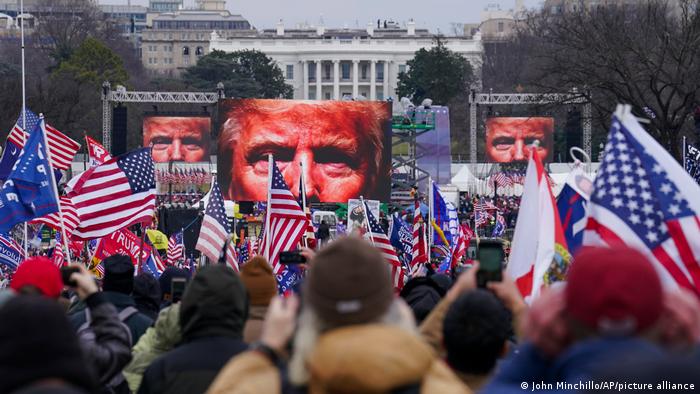

How is this not blasphemy?
— BrooklynDad_Defiant!☮️ (@mmpadellan) September 20, 2022
Explain it to me like I'm five. pic.twitter.com/juUb8gobB4
2.3.2.6 Gerrymandering
A fundamental principle of democracy is that a citizen's vote counts as much as anyone else's. Gerrymandering undermines this principle by drawing electoral districts to favor one party over another. The two basic techniques of gerrymandering are:
- Cracking. Splitting a group of like-minded people into multiple districts to dilute their voting power.
- Packing. Cramming like-minded people into as few districts of power, so they're more likely to win a smaller number of seats, but less likely to win the number of seats they deserve.
At the federal level, gerrymandering means that representation is not proportional to the votes of the electorate. According to the Brennan Center for Justice, gerrymandering provides Republicans with a "durable advantage of 16–17 seats" in Congress. While this may not sound like a lot of the 435 seats in the house, only about 30 of those seats are considered "swing seats."
At the state level, gerrymandering locks in minority-rule. According to one study, 59 million people in six states live under minority rule of their state legislatures. For example, the Brennan Center found that
[I]n 2018, Democrats in Wisconsin won every statewide office and a majority of the statewide vote, but thanks to gerrymandering, won only 36 of the 99 seats in the state assembly.
2.3.2.7 Loss of trust in elections
Because democracy is a system of self-governance, it requires that citizens have a minimum amount of trust in each other and governmental institutions and processes for it to work. Jeffrey Abramson of the Aspen Institute wrote
we should not fear popular mistrust of a particular administration as if it were a threat to democracy (“throw the bums out”). However, loss of general trust in the rules of the game, the good faith of the other side, or the fairness and competence of government is a more serious matter. When the legitimacy of particular instances of distrust hardens into a continuous, generalized distrust that causes citizens “to reflexively respond to politics with distrust even when it is not justified,” then the ability of government to function well is harmed.6 This is the malaise that American democracy faces today.
In July 2022, a CNN poll found that
Only 42% [of Americans] have some confidence, and just 16% are very confident... that US elections reflected the will of the people.... In early 2021, 90% of Democrats said they were at least somewhat confident that elections reflected the will of the people; now [in July 2022], just 57% are. Among independents, the share who have at least some confidence has fallen from 54% to 38%. Among Republicans, by contrast, confidence has modestly increased but remained low, from 23% confident then to 29% now.
If enough people lose faith in our shared system of democracy, the it will cease to function.
2.3.3 Erosion of good governance
Citizens of a democracy deserve and expect government officials to be upstanding citizens, represent their best interests, and put in their best effort to run the government effectively.
2.3.3.1 Nepotism
Nepotism is a signature of autocratic governments around the world. Hiring relatives provides the autocratic leader both increased power and a feeling of security. As Sarah Kendzior writes, "The longer autocrats stay in power, the smaller the inner circle becomes, and the more kinship ties tend to dominate. Parties bound by blood or marriage are easier to control.... They tend to be trustworthy confidants in regimes rife with paranoia [and are] excellent vessels for laundering money, creating enough disstance that assets stolen from the state are harder to track."
The most egregious examples of recent nepotism are Trump's hiring of his daughter Ivanka Trump and her husband Jared Kushner. Kushner was initially not granted a security clearance because, according to Kendzior:
- "lied on his security clearance forms more than any person in US history"
- was "carrying $1.4 billion in debt" on family property
- "lobbied for a Qatari blockade after Qatar refused to provide his family a loan to pay off its massive debt"
- "met with the president of a sanctioned Russian bank as part of yet another debt payoff scheme"
- "met illicitly with other Russians connected with plots to subvert the 2016 election" including devising a secret back-channel with the Kremlin and "attending the notorious 2016 Trump Tower meeting"
- "obstructed justice by helping to fire James Comey"
- "oversaw the Cambridge Analytica data mining operation that became a key subject of the Mueller probe"
- "helped Saudi prince Mohammad bin Salman cover up the murder of Washington Post journalist Jamal Khashoggi"
- "Illicitly proposed giving the Saudis nuclear secrets"
- "Used personal email and private apps to communicate with foreign leaders," the reason why Republicans wanted to "lock her up."
When red flags such as these prevented Kushner from getting a top-secret security clearance, Trump ordered his chief of staff to give Kushner one anyway.
Other examples of nepotism in the Trump administration given by Kendzior include:
- "Secretary of Education Betsy DeVos, who opposes public education, is the sister of military mercenary Erik Prince, a key operator in Trump's network of back-channel trades with other kleptocracies"
- "Secretary of Transportation Elaine Chao is the wife of Senate Majority Leader Mitch McConnell."
- "The appointment of Attorney General William Barr was followed by the appointment of Barr's son-in-law, Tyler McGaughey, as Trump's White House legal counsel and his daughter, Mary Daly, as an employee of the Treasury."
Tangled authoritarian webs
According to Sarah Kendzior, Wendi Deng, the ex wife of Rupert Murdoch (who owns Fox News and is heavily responsible for getting Trump elected) orchestrated the reunion of Ivanka Trump and Jared Kushner (after a breakup) on the Murdoch family yacht. She later divorced Murdoch and dated Vladimir Putin during Trump's 2016 campaign, before she was revealed to be a Chinese spy.
2.3.3.2 Separation of powers
As discussed above, an important guardrail of democracy is forbearance, which is self-restraint in exercising power. An example of this is that presidents are not supposed to meddle in the operations of the Department of Justice. During the 2016 campaign, former president Bill Clinton had an impromptu meeting with then-Attorney General Loretta Lynch and it caused widespread concern because Lynch was investigating Hillary Clinton's email practices at the time.
In contrast, Trump requested a pledge of loyalty from FBI director James Comey, who was investigating Trump's ties with Russia, and then fired him when he refused (and admitted on TV that was the reason).
It now appears that Trump may have reached into the Treasury Department to use the IRS to punish Comey and Andrew McCabe, who was acting FBI director after Comey was fired.
Trump also reached into the Department of Commerce to improperly interfere with the 2020 census for political gain.
2.3.3.3 Profiting from presidency
To reduce the chances of federal government officials being influenced by foreign governments or states, or falling prey to corruption in general, the framers of the constitution included both a Foreign Emoluments Clause and a Domestic Emoluments Clause. When a government official accepts payments or gifts from anyone besides the government, we can't be sure if they are acting/did act/will act in the best interest of citizens or themselves.
Presidents prior to Trump divested themselves of their financial interests before taking office. In contrast, Trump kept his real estate/golf businesses operating.
This provided ample opportunity for violations of the emoluments clause. One of his businesses, the Trump International Hotel Washington DC, was only two blocks from the White House. Every business group and foreign government that wanted to curry favor with Trump stayed there, and the hotel got over $3.7 million from foreign governments from 2017 to 2020. It wasn't even legal for Trump to own it at the time because the lease with the US Government Services Agency (GSA), which owned the building, contained a conflict of interest clause saying that "no elected official of the government ... shall be admitted to any share or part of this Lease, or to any benefit that may arise therefrom."
Another way that Trump profited from the presidency was making the Secret Service rent space from his businesses. According to Citizens for Ethics, "The Secret Service has spent nearly $2 million of taxpayer money at Trump properties, literally paying Donald Trump for the right to protect him and his family"
Another way that Trump profited was visiting his businesses over 500 times while in office. "[W]hen he brings some of the country's highest ranking government officials, he sends a message around the world that Trump businesses are centers of power and fluence. These VIP visits also bring a ton of publicity to the businesses, not to mention hundreds of thousands of dollars in taxpayer money."
The presidency also allowed Trump's family to make huge amounts of money. According to Citizens for Ethics, Jared Kushner and Ivanka Trump reported between $172 million and $640 million in outside income while working in the White House. This income includes Ivanka's ownership stake in the Trump Hotel in DC and income from her namesake business. Russia renewed two trademarks and China awarded her three trademarks for her business while she worked for her father.
Saudi Arabia recently invested $2 billion in Jared Kusnher's business. Because the deal made little business sense,
Ethics experts say that such a deal creates the appearance of potential payback for Mr. Kushner's actions in the White House — or of a bid for future favor if Mr. Trump seeks and wins another presidential term in 2024.
On a trip to Dallas I [talked with] one of [Trump's] wealthy supporters. Yes, she told me, he is corrupt – but so, she believed, were all of the presidents who went before him. "We just didn't know about it before." That idea gave her – an upstanding citizen, a law-abiding patriot – the license to support a corrupt president. If everybody is corrupt and always has been, then whatever it takes to win is okay.
2.3.3.4. Campaigning at the White House
It is unprecedented in modern politics for the White House to be used as the site of an explicitly political event, with past presidents maintaining some boundaries between the office of the presidency and their re-election bids. Trump [smashed] those norms [by]:
- Attacking Joe Biden from the Rose Garden during the 2020 campaign.
- Playing campaign-style videos in the White House briefing room.
- Delivering a speech to the Republican National Convention from South Lawn.
2.3.3.5 Court packing
Justic Antonin Scalia died in Feb. 2016. President Obama nominated Merrick Garland on March 16 to replace him. Mitch McConnell, the Senate Majority Leader at the time, refused to hold hearings.
This wasn't the first time that the Senate had refused to act on a president's SCOTUS nomination. But the last time was in the 1840s when the Whigs refused to consider John Tyler's nominee. Therefore, this is a clear example of breaking of democratic norms established over the previous 170 years.
Following this indecent behavior, Republicans then forced through Brett Kavanaugh's nomination, even though he had been credibly accused of attempted rape and numerous other instances of sexual misconduct. "The FBI gathered more than 4500 tips relating to Kavanaugh without any apparent further action by investigators"
Truly remarkable numbers. In just under two years public approval of the US Supreme Court has fallen from 66% to 38%. Simply unprecedented in rapidity. This is what fatal loss of institutional legitimacy looks like. https://t.co/HJU0x0GtPp pic.twitter.com/PHWh8aw0k0
— Josh Marshall (@joshtpm) July 20, 2022
Alito has repeatedly spoken before conservative groups & at their fundraisers. He belittled democratic policies in those speeches. He dismisses facts he doesnt like in his opinions. He sneers at parties who disagree with GOP politics. Thats part of why SCOTUS has lost legitimacy.
— Kurt Eichenwald (@kurteichenwald) September 14, 2022
2.3.3.6 Unethical pardons
The normal process for receiving a presidential pardon is to apply to the Department of Justice's Office of the Pardon Attorney. If the applicant has demonstrated good conduct for at least five years since conviction, and meets other requirements, the office will forward the request to the president for review.
There have been some exceptions to this process over the years, which raised eyebrows at the time, such as Ford pardoning Nixon, George H.W. Bush pardoning some Iran-Contra participants, and Bill Clinton pardoning billionaire fugitive Marc Rich and his own brother, Roger Clinton.
Trump's use of the pardon completely obliterated previous norms.
To start, Trump essentially eliminated the Office of the Pardon Attorney from the process. According to the Washington Post, "pardon seekers ended up on the president’s radar after conservative activists, television commentators, or other friends of Trump made personal appeals on their behalf."
According to Wikipedia, Trump:- had a personal or political connnection to at least 89% of people receiving pardons.
- granted clemency to five of his former campaign staff members and political advisers Paul Manafort, Roger Stone, Michael Flynn, Stephen K. Bannon, and George Papadopoulos
- pardoned five people convicted as a result of investigations into Russian interference in the 2016 presidential elections.
- pardoned his daughter Ivanka's father-in-law, Charles Kushner.
- granted executive clemency to three court-martialed U.S. military officers who were accused or convicted of war crimes in Iraq and Afghanistan, which "undermined military discipline, constituted an inappropriate interference in the U.S. military justice system, and called into question the U.S. commitment to the law of armed conflict."
- pardoned seven Republican congressmen
- pardoned four Blackwater guards convicted of killing Iraqi civilians. Blackwater was founded by Erik Prince, Trump's long-time political ally and brother of Education Secretary Betsy DeVos.
According to the Washington Post
Taken together, the rogues’ gallery of criminals receiving clemency this week showcased Trump’s willingness to exert raw political power for his own personal gain, handing out favors to friends at a time when he is seeking GOP support for his flailing bid to reverse his election loss.... [The pardons] rocked Washington and sparked calls for an overhaul of the constitutional power....
For their part, Republican lawmakers have largely been silent — abandoning the kind of outrage they expressed when Democratic presidents issued pardons to political allies on a far smaller scale.
Trump... told allies he wants to erode the Mueller probe [into cooperation with Russia.] The defiant tone drove home another way Trump’s pardons differ from those of his predecessors: Many of the recipients are unrepentant and the White House has portrayed the prosecutors as the actual wrongdoers.
[S]ome onetime Trump allies who cooperated with the investigation and expressed remorse for their crimes have not received pardons. They include Trump’s former personal attorney Michael Cohen and former deputy campaign manager Rick Gates. After Cohen implicated Trump in several crimes, Trump lashed out at him and called him a “rat.”
The first time William Barr was attorney general, he worked with George H.W. Bush to pardon the Iran-Contra convicted criminals in 1992. At the time, this was viewed as a miscarriage of justice and possibly done to conceal Bush's role in the scandal.
2.3.3.7 Lying
Citizens have a right to expect to be told the truth by government officials (wtih limited exceptions when security may be put at risk). Trump made 30,573 false or misleading claims over 4 years.
2.3.3.8 Criminality
The U.S. is a "nation of laws," and government officials need to obey the law too. Citizens deserve to be represented by respectable, trustworthy, ethical people. Government officials are leaders, and part of leadership is exhibiting behavior that should be emulated.
Democracy is eroded when criminals or people credibly accused of criminal behavior are elected to office, and when people remain in office after crimes are discovered.
When Trump was elected, he had been credibly accused of sexual misconduct and/or rape by 25 women since the 1970s and had been involved in over 4,000 lawsuits spanning three decades. Topics of these suits involved branding/trademarks, casinos, contract disputes (e.g. Trump University), employment, golf clubs, taxes, personal injury, and real estate.
Using the presidency to escape consequences for crimes is a trail blazed by other authoritarian-style leaders. Ruth Ben-Ghiat writes in her book Strongmen [p.159]:
In 2003, facing the charge that his holding company Fininvest paid a €500 million bribe to a Roman judge in 1991, Prime Minister Berlusconi went on one of his television networks to proclaim himself a victim of a "witch hunt." No other liberal democracy allowed heads of state to be judged by the courts, he falsely stated. In fact, Berlusconi had returned to office two years earlier with ten court cases proceeding against him, and parliament had obligingly passed a law that gave a degree of immunity to the individuals holding the five highest positions in government. Throughout his time in office, dozens of ad personam measures made it easier for him to disobey the law without consequences. Berlusconi repeatedly escaped conviction for past actions and used delaying tactics to run out the clock on new ones.
In addition to criminality in the executive branch, misconduct among congressmembers has skyrocketed since 2010, among both Democrats and Republicans.
Habba expresses a truth about the way authoritarians think and operate. Breaking the law is an everyday activity, it is...mundane. https://t.co/2o9HYE73sE
— Ruth Ben-Ghiat (@ruthbenghiat) August 31, 2022
In new interview, Trump says he met with J6ers recently and is “financially supporting” some of them. Then says if he wins re-election he will be “looking very strongly at full pardons” for all J6 defendants, “with an apology” from the govt. pic.twitter.com/xdIVEMt7Sf
— Ron Filipkowski 🇺🇦 (@RonFilipkowski) September 1, 2022
2.3.3.9 Party over country
In days of yore, when Republican malfeasance was discovered, such as Watergate, other party members participated in the investigation and meting out of punishment.
One illustration of this is the Republicans' shifting reaction to the Jan. 6 insurrection. During the attack, politicians like then-House Majority Leader Kevin McCarthy and Fox News personalities like Laura Ingraham and Sean Hannity begged Trump to call off his supporters. Soon after the attack, Republicans including Mitch McConnell and Ted Cruz condemned the attack.
Soon, though, they circled the wagons and now have nothing negative to say about it. When Trump was impeached for inciting the insurreciton, 197 of 211 Republican representatives and 43 of 50 Republican senators voted against impeachment, and the Republican National Committee censured Representatives Liz Cheney and Adam Kinzinger for participating in the House January 6 Committee.
Authoritarian-style discipline and the classic "make an example" tactic. Goal is to keep the party's crimes secret by dissuading others from telling the truth. https://t.co/pOp7fHPIzl
— Ruth Ben-Ghiat (@ruthbenghiat) July 20, 2022
Another example of Republicans putting party over country is their vote against certifying the 2020 presidential election results. Only hours after the Jan. 6 insurrection, 147 Republican congress members objected to the certification of the election results, despite having no legitimate reason to do so.
According to Prof. Steve Vladeck
[T]he goal of GOP lawmakers seems to have been to try to appease and appeal to the president's supporters — to whom no amount of contrary evidence and/or rejections of these claims in court have sufficiently established that 81 million Americans voted for the other guy. In the process, these objections serve only to perpetuate conspiracy theories and delegitimize the clearly legitimate election of our country's 46th president.
Another way Republicans put their party over the country is by attempting to block as much legislation as possible. Legislation is needed for the country to make progress and address the problems it's facing. Republicans, however, see legislation as a zero-sum-game: if legislation passes while a Democratic president is in power, it strengthens the Democrats' hand in the next election, while failure to pass legislation can be painted as a failure of the Democrats, strengthening the hand of Republicans in the next election. Senate Minority Leader Mitch McConnell said he is "100 percent" focused "on stopping" President Joe Biden's administration.
2.3.3.10 Influence of money in legislation
We don't live in a direct democracy. If we did, then the chance of a particular bill being passed into law would directly correlate with the fraction of citizens who support that legislation (with some exceptions for how many people turn out to vote, veto power by the president, etc.). We live in a representative democracy, though. We elect government officials to become well versed in policy issues and then write/evaluate bills on our behalf. Even though there's this layer in between citizens and legislation, you would still expect a pretty strong correlation between legislation and what the general populations wants.
However, a landmark 2014 study by Prof. Gilens of Princeton and Prof. Page of Northwestern University found that
economic elites and organized groups representing business interests have substantial independent impacts on U.S. government policy, while average citizens and mass-based interest groups have little or no independent influence.
In other words, wealthy people and corporations get the legislation they want, but regular people do not.
The policy/legislation cases examined in this study were from the period 1981 to 2002. Although there has been a flood of money from the wealthy and corporations into elections since the SCOTUS Citizens United ruling in 2010, that was not the cause of these results.
2.3.4 Erosion of rights
Democratic governments treat citizens fairly and respect their rights and liberties, no matter how much power or wealth they have. Unfortunately, this respect has been waning.
2.3.4.1 Reduced privacy
A classic tactic of authoritarians is to use a crisis to gain control. Hitler used the Reichstag fire to take control of Germany. Putin used bombings of apartment buildings in Russia by "Chechens" (who used large amounts of explosive that's exclusively controlled by the Russian FSB).
After the 9/11 terrorist attack, Republicans led the passage of the USA PATRIOT Act a mere 6 weeks later. As the ACLU puts it:
Most of the changes to surveillance law made by the Patriot Act were part of a longstanding law enforcement wish list that had been previously rejected by Congress, in some cases repeatedly. Congress reversed course because it was bullied into it by the Bush Administration in the frightening weeks after the September 11 attack. The Senate version of the Patriot Act, which closely resembled the legislation requested by Attorney General John Ashcroft, was sent straight to the floor with no discussion, debate, or hearings. Many Senators complained that they had little chance to read it, much less analyze it, before having to vote. ... The Bush Administration implied that members who voted against it would be blamed for any further attacks - a powerful threat at a time when the nation was expecting a second attack to come any moment and when reports of new anthrax letters were appearing daily....
The result is unchecked government power to rifle through individuals' financial records, medical histories, Internet usage, bookstore purchases, library usage, travel patterns, or any other activity that leaves a record.
The PATRIOT Act and follow-on programs at the National Security Administration and other agencies, such as the PRISM program are used to spy on Americans' electronic communications. (As a safeguard against , domestic spy activity has to be approved by the FISA court. Fortunately for the spies, 100% of their requests are approved.)
Today, most Americans assume that the government is monitoring their phone calls and emails. Personally, I feel that the regular collection/monitoring of communications violates the Fourth Amendment, which enumerates our right to privacy, a fundamental aspect of democracy.
2.3.4.2 American Oligarchs
America has two systems of justice: one for the wealthy and one for the rest of us. As Sen. Elizabeth Warren notes:
Four words are etched above the doors to the Supreme Court: "Equal Justice Under Law." That simple principle should be the foundation of our criminal justice system. But the hard truth is that America has two separate and very unequal justice systems. The first is a justice system exclusively for the wealthy and the well connected. For decades, Washington has let powerful corporate executives escape accountability, even when they scam millions of Americans or crash the U.S. economy.
Take the 2008 financial crisis, when brazen risk-taking and illegal behavior cost the American economy $23 trillion and robbed millions of Americans of their homes, jobs, and savings. A decade later, not a single big bank CEO has gone to jail, and prosecutors have become even more lenient on corporate criminals. My office recently released a new report highlighting that white-collar crime enforcement activity has hit a 20-year low since President Trump took office.
The second criminal justice system - the system for everyone else - looks very different. In that system, "tough on crime" is the catchphrase of choice. Low-income individuals end up with criminal records or jail time because they can't afford bail or hefty fines and fees. Young people who commit low-level, nonviolent crimes spend too many years behind bars. Struggling parents, domestic violence survivors, opioid users, and individuals with mental illness are hauled off to jail without treatment or assistance. And after they return to their communities, too many former inmates are locked out of jobs, housing, and any chance to rebuild their lives and support their families.
That second criminal justice system disproportionately targets and punishes black and brown Americans. African Americans account for only 12 percent of adults in the United States, but they make up 33 percent of the incarcerated population. And the data show that for exactly the same crimes, black people are more likely to be arrested, prosecuted, wrongfully convicted, and sentenced more harshly than their white counterparts.

#7YearsNoIndictmentpic.twitter.com/yIGH5rTxPj
— Don Winslow (@donwinslow) September 22, 2022
Besides no one being prosecuted for causing the 2008 financial crises another example of the wealthy being above the law includes the lack of prosecutions for illegally hiding wealth via offshore finances. Journalists exposed three such schemes involving "unethical tax avoidance to criminal tax evasion, fraud, corruption, and money laundering" via the
The nonprofit Freedom House notes that the uncovered
practices pose a multifaceted threat to democratic governance. They undermine the rule of law, they rob states of revenue and hollow out public services, and they fuel populist resentment by magnifying the perception that the system is rigged in favor of wealthy elites. The world's worst cases show that, when allowed to fester, these problems can exacerbate one another and set a country on a path toward institutional breakdown or even state failure.
Possibly the only person to be punished as a result of these offshore finance revelations was Daphne Caruana Galizia, the journalist who led the Panama Papers investigation, when she was killed by a car bomb.
According to The New Yorker, the Paradise Papers "exposed the financial engineering used by more than a dozen advisers, donors, and Cabinet members of President Donald Trump. His Commerce Secretary, Wilbur Ross, was found to have a stake in a shipping company registered in the Marshall Islands, which received millions of dollars a year from a Russian firm controlled by Putin's son-in-law."
2.3.4.3 Extra-judicial law enforcement
In addition to monitoring our communications, the 9/11 attack led to the government going outside the bounds of law enforcement and the Geneva Conventions, such as
- Kidnapping ("extraordinary rendition") of suspected terrorists and bringing them to "black sites" around the world and Guantanamo Bay. (The practice started before 9/11, but was then greatly expanded.
- Torture ("enhanced interrogation") of suspects, which violates the Geneva Conventions of 1929 and 1949.
- Indefinite detention of suspected terrorists without trial.
Trump used federal agents without any identifying insignias against protestors across the country. (Neither badges nor any markings indicating what group they were a member of.) Sometimes, these agents arrested people and took them away in unmarked vehicles. This was an example of a democratic norm, not a law, being violated at the time. In January 2021, Congress passed a law that required federal agents to display "visible identification of themselves and the name of the government entity employing them."

2.3.4.4 Reduced right to peaceful assembly
The International Center for Not-For-Profit Law says that since January 2017, 45 states have considered 245 bills that restrict the right to peaceful assembly, which is guaranteed in the First Amendment. Of these bills, 39 have been enacted into law and 12 are pending as of June 2022.
2.3.5 Democracy ratings
According to Prof. Barbara F. Walter [p. 20]
There are three widely used datasets that measure a country's system of governance: Polity V, Freedom House, and V-Dem. Each relies on its own definition of democracy, and therefore measures democracy in different ways.... Despite these differences, scholars have found a high level of agreement in terms of how countries are coded in each dataset, and high intercorrelations between the democracy measures included in each.
The countries that score at the top of the Polity, Freedom House, and V-Dem ratings are:
- Costa Rica
- Denmark
- Finland
- Germany
- Ireland
- Netherlands
- New Zealand
- Norway
- Portugal
- Spain
- Sweden
- Switzerland
- Uruguay
2.3.5.1 Polity rating
According to Walter, the Polity data series "is particularly interested in the durability of different types of governments and their political institutions." It was started in the 1960s and was funded via the CIA. Its funding ended in 2020.
The Polity data, compiled by the Center for Systemic Peace, gives a rating to every country from -10 to +10, and groups those scores into "autocracies," "closed anocracies," "open anocracies," "democracies," and "full democracies". They note that:
The USA dropped below the "democracy threshold" (+6) on the POLITY scale in 2020 and was considered an anocracy (+5) at the end of the year 2020; the USA score for 2021 returned to democracy (+8).
Walter says that the January 6 insurrection
led to America's polity score dropping from a +7 to a +5, the lowest score since 1800. The United States [was] an anocracy for the first time in more than two hundred years. Let that sink in. We are no longer the world's oldest continuous democracy. That honor is now held by Switzerland, followed by New Zealand, and then Canada. We are no longer a peer to nations like Canada, Costa Rica, and Japan, which are all rated a +10 on the polity index.
Other countries with a +8 rating like the U.S. include Brazil, Ghana, Kosovo, Mexico, and the Philippines.
Anocracy or semi-democracy is a form of government that is loosely defined as part democracy and part dictatorship, or as a "regime that mixes democratic with autocratic features." Another definition classifies anocracy as "a regime that permits some means of participation through opposition group behavior but that has incomplete development of mechanisms to redress grievances."
2.3.5.2 Freedom House rating
Walter writes that
Freedom House focuses heavily on individual freedoms and includes detailed measures on citizens' political rights and civil liberties.
Freedom House rates freedom on a scale from 1 to 100 and divides these ratings into "not free," "partly free," and "free."
The U.S. currently scores 83 and is therefore "free." Other countries with a score of 83 include Panama and Romania. The countries with the five highest scores are Canada, New Zealand, Finland, Norway, and Sweden.
2.3.5.3 V-Dem rating
Varieties of Democracy, or V-Dem, was started in 2014 and looks at different dimensions of democracy.
V-Dem gives 5 ratings for each country, but their flagship rating is the liberal democracy index with a scale from 0.00 to 1.00.
The U.S. gets a rating of 0.74 as of 2022. Countries with similar scores are Latvia and Lithuania.
"Liberal democracy" does not indicate liberal, progressive, or left-leaning policies. Liberal democracy means a full democracy with free and fair elections, good governance, respect for citizens' rights, etc.
Three researchers at the V-Dem Institute developed a methodology, called "Regimes of the World (RoW)" to classify countries into one of four regime types: liberal democracies, electoral democracies, electoral autocracies, and closed autocracies. According to V-Dem [p. 37], the US is barely holding onto its status as a liberal democracy:
While the United States remains a liberal democracy, V-Dem data shows that it is only a fraction away from losing this status after substantial autocratization. The U.S. LDI score dropped from 0.85 in 2015 to 0.72 in 2020, driven by weakening constraints on the executive under the Trump administration.
Simultaneously, polarization and government misinformation escalated and remain high in 2021. Political use of social media exacerbates the polarization. Fake news, hate speech, conspiracy theories, and distrust have intensified negative feelings, prejudice, and violence between Republicans and Democrats since the run-up to the 2016 election.
...[L]iberal democracy remains significantly lower than before Trump came to power. Government misinformation declined last year but did not return to previous levels. Toxic levels of polarization continue to increase. Democracy survives in the United States, but it remains under threat.
New York Times columnist Thomas Edsall notes
Of 179 countries surveyed, V-Dem found that the United States was one of 33 to have moved substantially toward “autocratization.” From 2016, when Trump won the presidency, to 2021, when he involuntarily left office, the United States fell from 17th to 29th in the global V-Dem democracy rankings
- In liberal democracies, citizens have further individual and minority rights, are equal before the law, and the actions of the executive are constrained by the legislative and the courts.
- In electoral democracies, citizens have the right to participate in meaningful, free and fair, and multi-party elections.
- In electoral autocracies, citizens have the right to choose the chief executive and the legislature through multi-party elections; but they lack some freedoms, such as the freedoms of association or expression, that make the elections meaningful, free, and fair.
- In closed autocracies, citizens do not have the right to choose either the chief executive of the government or the legislature through multi-party elections.
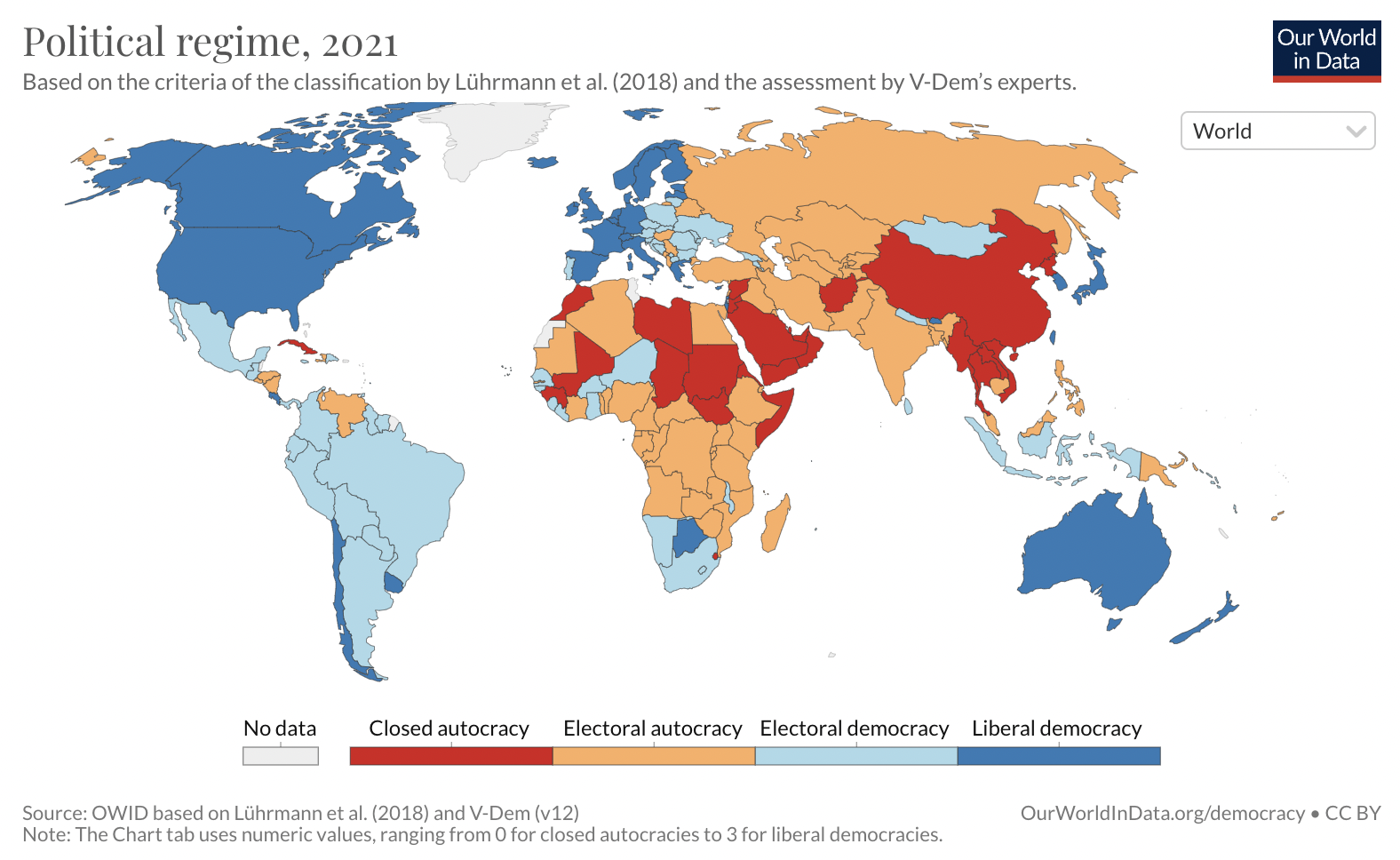
We tend to think of the US as a "shining city on a hill," or a beacon of hope for other countries. These ratings show that this is no longer the case, and we have a lot of collective work to do to earn the admiration of other countries.
2.4.1 Trump and Putin
Autocrats tend to emulate other autocrats. Hitler admired Mussolini, and kept a bust of the inventor of fascism on his desk [Ruth Ben-Ghiat, p. 30]. Trump worked hard for the approval of Putin.
Trump met with Putin several times. Each time, Trump either barred Americans from the meeting (allowing only Russians to attend), or used an American translator but then destroyed the translator's notes immediately afterwards, so we don't know what was discussed. We do know that
- In May 2017, Trump revealed highly classified information to the Russian foreign minister and ambassador.
- In July 2017, Trump said "Putin & I discussed forming an impenetrable Cyber Security unit so that election hacking, & many other negative things, will be guarded and safe." Marco Rubio pointed out that "Partnering with Putin on a 'Cyber Security Unit' is akin to partnering with Assad on a 'Chemical Weapons Unit'."
- In Nov. 2017, Trump asked Putin about Russian meddling in the 2016 election. He said that Putin denied it. “Every time he sees me he says, ‘I didn’t do that,’ and I really believe that when he tells me that, he means it,” Mr. Trump told reporters. “I think he is very insulted by it, which is not a good thing for our country.”
- In March 2018, the day that Putin handily won reelection after barring anti-corruption activist Alexei Navalny from running (and soon after Putin had poisoned a former Russian spy in Britain with a powerful nerve agent), Trump called Putin and congratulated him, after his staff gave him a note stating in all-capital letters “DO NOT CONGRATULATE.”
- In February 2022, Trump called Putin's invasion of European democracy Ukraine "genius" and "savvy."
We don't know the reasons behind Trump's affinity for Putin. Maybe it's the money. In 2014, Eric Trump said "We don’t rely on American banks. We have all the funding we need out of Russia." Or maybe it's a psychological need for approval from a harsh father figure.
The Ass and His Purchaser
by Aesop
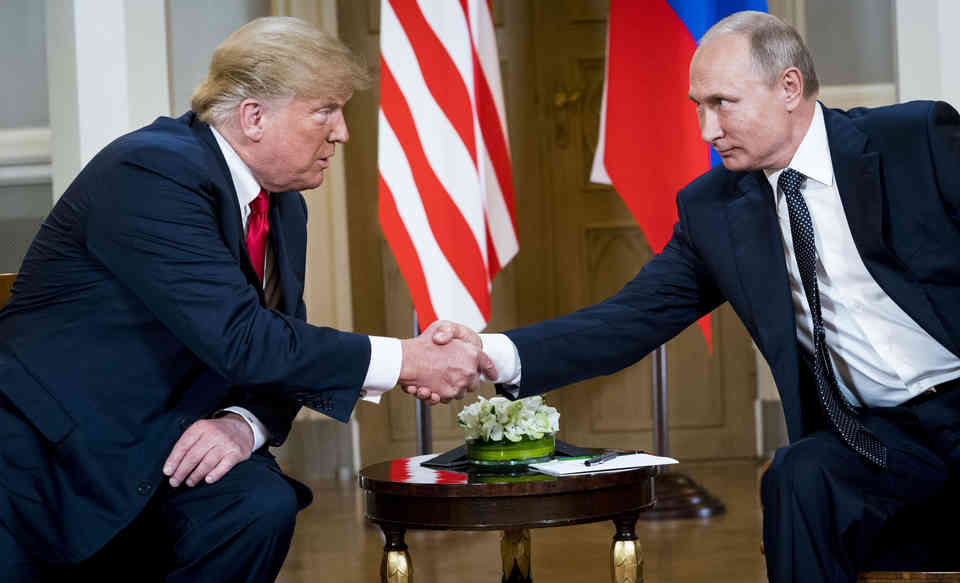
A Man who wanted to buy an Ass went to market, and, coming across a likely-looking beast, arranged with the owner that he should be allowed to take him home on trial to see what he was like. When he reached home, he put him into his stable along with the other asses. The newcomer took a look round, and immediately went and chose a place next to the laziest and greediest beast in the stable. When the master saw this he put a halter on him at once, and led him off and handed him over to his owner again. The latter was a good deal surprised to see him back so soon, and said, "Why, do you mean to say you have tested him already?" "I don't want to put him through any more tests," replied the other: "I could see what sort of beast he is from the companion he chose for himself."
A man is known by the company he keeps.

2.4.2 Republicans and Hungary
Republicans appear to be using Hungary as a model for where they want to take the U.S.
- FOX News host, Republican thought leader, and potential presidential candiate Tucker Carlson broadcast his FOX News show from Hungary for a week in August 2021 and interviewed Viktor Orbán.
- In January 2022, Trump endorsed Orbán for Prime Minister of Hungary, and the New York Young Republican's Club threw in their endorsement for good measure.
- The Conservative Political Action Conference (CPAC) is the main political conference for conservative activists and elected officials. The first CPAC was in 1974, when Ronald Reagan was the keynote speaker. In May 2022, Orbán spoke to the attendees when CPAC held a conference in Hungary
- Orbán addressed CPAC again in August 2022 at their conference in Dallas.
As discussed above, democracies now die by elected leaders who then violate democratic norms and use legal pathways to lock in authoritarianism. Orbán is the epitome of this method. According to Andrew Marantz in The New Yorker
Orbán has managed to preserve the appearance of formal democracy, as long as you don’t look too closely,” Anna Grzymala-Busse, the director of the Europe Center at Stanford, told [Marantz]. Since 2010, most of Hungary’s civic institutions—the courts, the universities, the systems for administering elections—have come to occupy a gray area. They haven’t been eradicated; instead, they’ve been patiently debilitated, delegitimatized, hollowed out. There are still judges who wear robes, but if Orbán finds their decisions too onerous he can appeal to friendlier courts. There are still a few independent universities, but the most prestigious one—Central European University, which was founded by Soros—has been pushed out of the country, and many of the public universities have been put under the control of oligarchs and other loyalists. There are still elections, yet international observers consider them “free but not fair”: radically gerrymandered, flush with undisclosed infusions of dark money. The system that Orbán has built during the past twelve years, a combination of freedom and subjugation not exactly like that of any other government in the world, could be called Goulash Authoritarianism. Scheppele contends that Orbán has pulled this off not by breaking laws but by ingeniously manipulating them, in what she calls a “constitutional coup.” She added, “He’s very smart and methodical. First, he changes the laws to give himself permission to do what he wants, and then he does it....”
Orbán runs for reëlection every four years. In theory, there is a chance that he could lose. In practice, he has so thoroughly rigged the system that his grip on power is virtually assured. The political-science term for this is “competitive authoritarianism....”
Republicans may not be able to rewrite the Constitution, but they can exploit existing loopholes, replace state election officials with Party loyalists, submit alternative slates of electors, and pack federal courts with sympathetic judges. Representation in Hungary has grown less proportional in recent years, thanks to gerrymandering and other tweaks to the electoral rules. In April, [Orbán's party] Fidesz got fifty-four per cent of the vote but won eighty-three per cent of the districts. “At that level of malapportionment, you’d be hard pressed to find a good-faith political scientist who would call that country a true democracy,” Drutman told me. “The trends in the U.S. are going very quickly in the same direction. It’s completely possible that the Republican Party could control the House, the Senate, and the White House in 2025, despite losing the popular vote in every case. Is that a democracy?
Lauren Stokes, a professor of European history at Northwestern University, said... “When a Hungarian court does something Orbán doesn’t like—something too pro-queer, too pro-immigrant—he can just say, ‘This court is an enemy of the people, I don’t have to listen to it.’ I think Republicans are setting themselves up to adopt a similar logic: if the system gives me a result I don’t like, I don’t have to abide by it.”

Viktor Orbán speaking at CPAC Hungary

Jared Kushner received the Hungarian Order of Merit today at their Consulate in NY. pic.twitter.com/2TrXXCPviT
— Ron Filipkowski 🇺🇦 (@RonFilipkowski) September 22, 2022
Heather Cox Richardson, professor of history at Boston College, notes
Orbán has eroded democracy in his country, replacing it with what he calls “illiberal democracy,” or “Christian democracy.” His country still holds nominal elections, but their outcome is preordained because the government controls all the media and has silenced opposition. Illiberal democracy rejects modern liberal democracy because the equality it champions means an acceptance of immigrants, LGBTQ rights, and women’s rights and an end to traditionally patriarchal society. Orbán’s model of minority rule promises a return to a white-dominated, religiously based society, and he has pushed his vision by eliminating the independent press, cracking down on political opposition, getting rid of the rule of law, and dominating the economy with a group of crony oligarchs.
What worried me most, sitting in the belly of the Whale, was not the person of Donald Trump but a Republican Party that resembled Orbán’s party, Fidesz, more by the month—increasingly comfortable with naked power grabs, with treating all political opposition as fundamentally illegitimate, with assuming that any checks on its dominance were mere inconveniences to be bypassed by any quasi-legalistic means.
“There are many things that the Americans here want to learn from the Hungarians,” Balázs Orbán [one of Viktor Orbán's closest advisors] had told me. “We’re going to keep our heritage for ourselves, our Christian heritage, our ethnic heritage... that’s what I think they want to say but they can’t say, and so they point to someone who can say it. If they want us to play that role, we are fine with that.”
Recommended reading

As discussed above, Freedom House monitors freedom under governments around the world. In 2019, Hungary became the first country in the European Union to be downgraded to no longer be considered "free."
2.5 Fascism
We discussed above that there's a spectrum of governments based on how free the citizens are, and the countries with the least-free citizens are lumped together as having authoritarian governments. Within the authoritarian end of the scale, there's a variety of types of repressive governments. The most virulent of these is fascism.
- aristochracy
- dictatorship
- fascism
- illiberal one-party state
- junta
- kleptocracy
- monarchy
- oligarchy
- theocracy
- totalitarian
There isn't a single accepted list of which historical regimes were fascist, beyond the WWII Axis nations (Italy, Germany, and Japan), their puppet states, and Austria before it was annexed by Germany. Some people choose to define fascism more broadly and include a number of other right-wing authoritarian governments.
Recommended reading
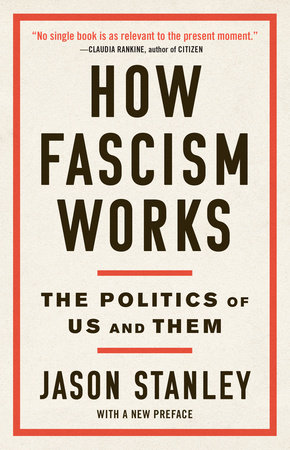
Boy these guys don’t like being called fascists. Maybe they should stop trying to overthrow their government and forcing raped women to have babies.
— Rep. Eric Swalwell (@RepSwalwell) August 30, 2022
2.5.1 Us vs. them
Because there's little agreement on which countries were fascist, there's no accepted definition of fascism either. However, a central tennet of all of them is the deliberate use of an "us versus them" division to stoke hate and fear to gain and maintain power.
The most telling symptom of fascist politics is division. It aims to separate a population into an "us" and a "them." Many kinds of political movements involve such a division; for example, Communist politics weaponizes class divisions. Giving a description of fascist politics involves describing the very specific way that fascist politics distinguishes "us" from "them," appealing to ethnic, religious, or racial distinctions, and using this division to shape ideology and, ultimately, policy. Every mechanism of fascist politics works to create or solidify this distinction.... As the fear of "them" grows, "we come to represent everything virtuous.

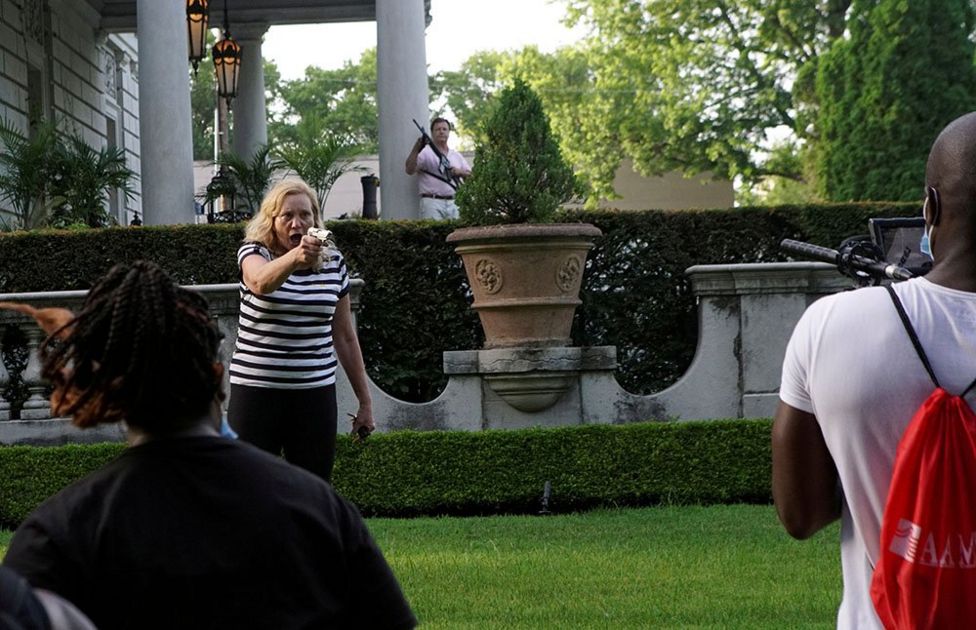
The Nazis primarily focused on four groups of scapegoats to send to concentration camps:
- Jews. Hitler and Goebbels believed that the Protocols of the Elders of Zion hoax was true (Stanley pp. 59-60) and that Jews were conspiring to take advantage of hard working Germans.
- Ethnic minorities, especially the Roma.
- LGBTQ people.
- People with disabilities.
In contrast, Republicans are scapegoating:
- Jews. Now referred to as "George Soros" and "globalists."
- Ethnic minorities, especially Blacks, Latinos, and Muslims.
- LGBTQ people.
- People with disabilities.
is an early-twentieth-century hoax, supposedly written as an instruction manual to Jews as a plot for world domination. Scholars have discovered that tit was liberally plagerized from Maurice Joly's 1864 book, A Dialogue in Hell Between Machiavelli and Montesquieu, a political satire set as a debate in hell between Montesquieu, who makes the case for liberalism, and Machiavelli, who makes the case for tyranny. Machiavelli's arguments for tyranny are transformed, in The Protocols, into arguments made by the "Elders of Zion," supposedly Jewish leaders bent on world domination.
This should have done it for all decent people.pic.twitter.com/7Xq9ok27o6
— Andrea Junker (@Strandjunker) August 22, 2022
2.5.4 Militias
Many authoritarian governments use political violence as a tool. The fascist governments of Italy and Germany are known for a particular type of violence: using civilian militias to gain and maintain power.
Mussolini organized his blackshirt squads in 1919. Over the next three years they grew in number and attacked and killed many of Mussolini's enemies, including "socialists, communists, republicans, Catholics, trade unionists, and those in cooperatives." In 1922 they surrounded Rome, ready to attack. The prime minister of Italy prepared for Rome to defend itself, but the king of Italy made Mussolini the prime minister instead, possibly out of fear of being dethroned. As a result, Mussolini became head of Italy through the threat of his miliatias.
Violence was so inherent in the practice of the movement, and so prominent in its ideology, that it cannot be treated merely as one aspect among others of the history of Fascism. Certain political movements, such as terrorism, are defined by their commitment to a particular mode of violent action. Indeed, the decision to undertake such a mode of action may be the original project, logically and temporally antecedent to the creation of a political organisation. Mussolini announced that the programme of the fasci di combattimento was 'contained in the name'. The Fascist movement from the beginning presented itself as a fighting organisation for civil conflict....
Hitler oversaw the organizing of brownshirts, also called stormtroopers or the SA. Initially, in the early 1920s, they were "ex-soldiers and beer-hall brawlers who were to protect gatherings of the Nazi Party from disruptions." By the time Hitler took power in 1933, the SA grew to 2,000,000, or twenty times as large as the number of troops and officers in the German Army. A second militia, the SS, started as a subset of the SA to serve as Hitler's bodyguards, and grew to 35,000 members by 1933. According to the Wiener Holocaust Library
The SA and the SS became symbols of terror. The Nazi Party used these two forces to terrify their opposition into subordination, slowly eliminate them entirely, or scare people into supporting them.

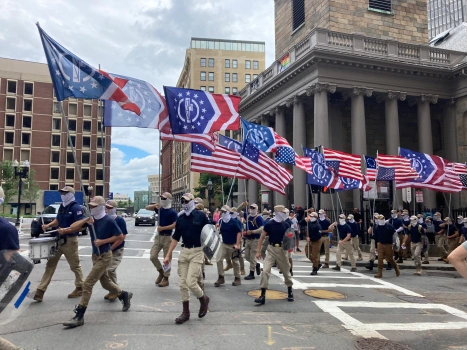
Some examples of the alignment of Republicans with militias include:
- At the Sept. 29, 2020 presidential candidate debate, Trump told the Proud Boys militia to "stand back, and stand by."
- The Three Percenters militia provided security for Marjorie Taylor Greene (R-GA) during a campaign event.
- Roger Stone used the Oath Keepers militia as security ahead of the January 6 riots.
- The January 6 House investigation found evidence of coordination between militias and Trump allies.


Like Fascists, Donald Trump provided shelter and validation to all kinds of extremists. Neo-Nazis, militia members, Oath Keepers, Proud Boys, and unaffiliated extremists with arsenals became his unofficial army on J6. Now they are the paramilitary wing of a radicalized GOP.
— Ruth Ben-Ghiat (@ruthbenghiat) July 12, 2022
2.5.5 Disinformation
Spreading disinformation is a strategy common to authoritarian governments, but was pioneered under fascism.
Trump from the first day of his presidency lying about the size of the crowd at his inauguration to his last, saying that he won the 2020 election in his "big lie". In between, he made 30,573 false or misleading claims.
Trump had long practiced making whatever false claims helped him politically, such as supporting the death penalty for the wrongly-convicted Central Park Five in 1989 and claiming in 2011 that Barack Obama wasn't born in the U.S.
Even the Big Lie about the 2020 election was old hat. According to Malclom Nance [p.17]
Trumps big lie strategy was actually nearly a decade old. During the 2012 presidential campaign between President Barack Obama and Senator Mitt Romney, Trump would go on Sean Hannity's Fox News show and imply that Romney lost because of voter fraud. Specifically, fraud in Cleveland and Philadelphia, two cities with large Black populations. He told Hannity, "I'm telling you, November 8, we better be careful, because that election is going to be rigged. And I hope the Republicans are watching closely, or it's going to be taken away from us."
Trump started the lie up again for the 2016 election, telling people at an August campaign event, "I'm afraid the election's going to be rigged. I have to be honest."
In fact, the rallying phrase "stop the steal" was planned before Trump was even elected president.
[Political operative Roger] Stone seems to have coined the phrase “Stop the Steal” — not in 2020, but in 2016. The URL www.stopthesteal.org was registered on Feb. 24 of that year — the day after the Nevada Republican caucuses, and the approximate moment when it began to sink in that Trump could actually win the nomination. After a loss to Ted Cruz in Iowa (which Trump claimed, baselessly, was fraudulent), he scored clear victories in the next two primaries. His lead lengthened in March, though Cruz did manage to eke out a few more wins that month — at which point remarkable claims began appearing on stopthesteal.org.
The sheer volume of the disinformation, much of which was easily refutable, was an intentional Republican tactic.
At the time, it felt to me like I was being sprayed with a firehose of lies and outrages. It turns out that wasn't a coincidence, and Republicans were using the Russian "Firehose of Falsehood" Propaganda Model.
Steve Bannon, Trump's chief strategist, renamed the Russian tactic "flooding the zone with shit."Many of the lies were easily refutable, so apparently the goal was not to get the public to believe the disinformation. So what were the purposes of this strategy?
Steve Bannon to Michael Lewis: "The Democrats don't matter. The real opposition is the media. And the way to deal with them is to flood the zone with shit." https://t.co/YuCqFJZ6M5
— Brian Stelter (@brianstelter) February 12, 2018
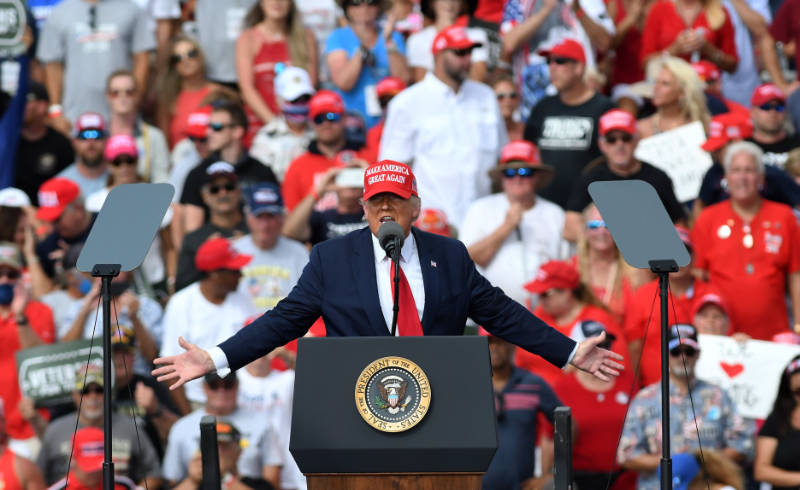
Walter C. Langer said Trump's primary rules for communication were:
- never allow the public to cool off
- never admit a fault or wrong
- never concede that there may be some good in your enemy
- never leave room for alternatives
- never accept blame
- concentrate on one enemy at a time and blame him for everything that goes wrong
- people will believe a big lie sooner than a little one
- if you repeat it frequently enough people will sooner or later believe it
Oh, wait, sorry, Langer wrote that in 1943 about Hitler.
2.5.5.1 Hacking the media
One goal was to take control of the media using underhanded techniques, or in other words to "hack the media."
The media's traditional roles include discussing what is new and noteworthy and presenting correct information to media consumers. They felt that it was their job to discuss and correct the lies and outrages spewing from the federal government.
The sheer quantity of propaganda is difficult to counteract. As the Rand Corporation says
It takes less time to make up facts than it does to verify them.... Don’t expect to counter the firehose of falsehood with the squirt gun of truth.
The "flood the zone" tactic keep the media completely occupied for years, and it allowed the administration to direct its attention (or "capture the news cycle") at will.
According to journalist Sean Illing
[I]t works because of the way we do business. We race for content, for clicks, for attention and we act like greyhounds chasing a slab of meat. Every time Trump would unleash one of his unhinged tweets or whatever, it was maddening, and it’s still maddening.
Like a magician using his wand to divert attention from a secret move, flooding the zone with shit diverted the public's attention from inconvenient facts like a president and his family running a business enterprise out of the oval office and the dismantling of democracy.
As Ruth Ben-Ghiat [p. 111] notes
Today's strongmen are well aware that every minute the public and the press spend on the outrage du jour is time they're not mobilizing for political action or investigating abuses of power.
Another type of disinformation that aids this goal is discrediting journalists by calling them "enemies of the people" and any critical reporting "fake news."
2.5.5.2 Giving up on the truth
Another purpose of spreading huge amounts of disinformation is to make citizens give up on trying to figure out the truth. Sean Illing said "flooding the zone" is
a very 21st century way of doing propaganda where the purpose isn’t to convince a society to believe the same thing. The point is to just flood it, overwhelm it with lots and lots of noise so that it’s very disorienting and very confusing and people do not know what to believe.... [I]t’s basically a way of manufacturing nihilism or at least cynicism.
This isn't a new goal or technique. Philosopher Hannah Arendt wrote in 1951 (as quoted by Ruth Ben-Ghiat [p. 106]
The ideal subject of totalitarian rule is not the convinced Nazi or the convinced Communist, but people for whom the distinction between fact and fiction (i.e., the reality of experience) and the distinction between true and false (i.e., the standards of thought) no longer exist.
Anne Applebaum, speaking with Ezra Klein, said
Well, cynicism, which is very close to nihilism and very close to apathy, are emotions that are often deliberately created by autocrats. For example, it is the policy of Putin's Kremlin, of his propaganda, to make Russians apathetic. And how is that done? That's done by offering them contradictory and sometimes ridiculous pieces of information that don't make sense.
The best example, famous example of this, was after the crash of MH17, the Malaysian plane that crashed in Ukraine in 2014 that was shot down accidentally by Russian soldiers, the state came out with completely different explanations. And sometimes, even the same television presenter would give one explanation and then a different explanation an hour later. And this kind of multiplication of explanations meant that people were totally disoriented. They said, we have no idea what happened, and we can never know.
I actually saw a kind of man on the street interviews that were done in Moscow a few days later. And people's attitude was, we have no idea. Well, it's impossible to find out, and so — and I think that was an attempt to create cynicism and create nihilism, and also to work on people's gullibility. So the idea is that people who feel less oriented, or they feel unable to be certain, you know, what the truth is, you offer them many different explanations, and they then become cynical.
[T]he fear that they can't know something, or the impression that it's impossible to know something [are] useful to autocratic regimes or to authoritarian movements because they lead people to feel that they're powerless. If you don't know what happened and you feel that you can never know what happened, then how can you do anything about it?
2.5.5.3 Joining the club
One of the reasons that people believe in conspiracy theories is that it bonds them with others who also believe. I suggest that while not all of Trump's lies rose to the level of conspiracies, taken collectively they can identify an in-group of people who believe the lies and an out-group that denies them.
This conspiratorial club-like attitude is protective of criminal and undemocratic behavior. In the before-times, if the president or other officials committed a crime there'd be investigations to uncover the truth. Now, any Republican who takes part in investigating Trump is automatically shunned. In other words, parroting lies is like flashing a membership card.
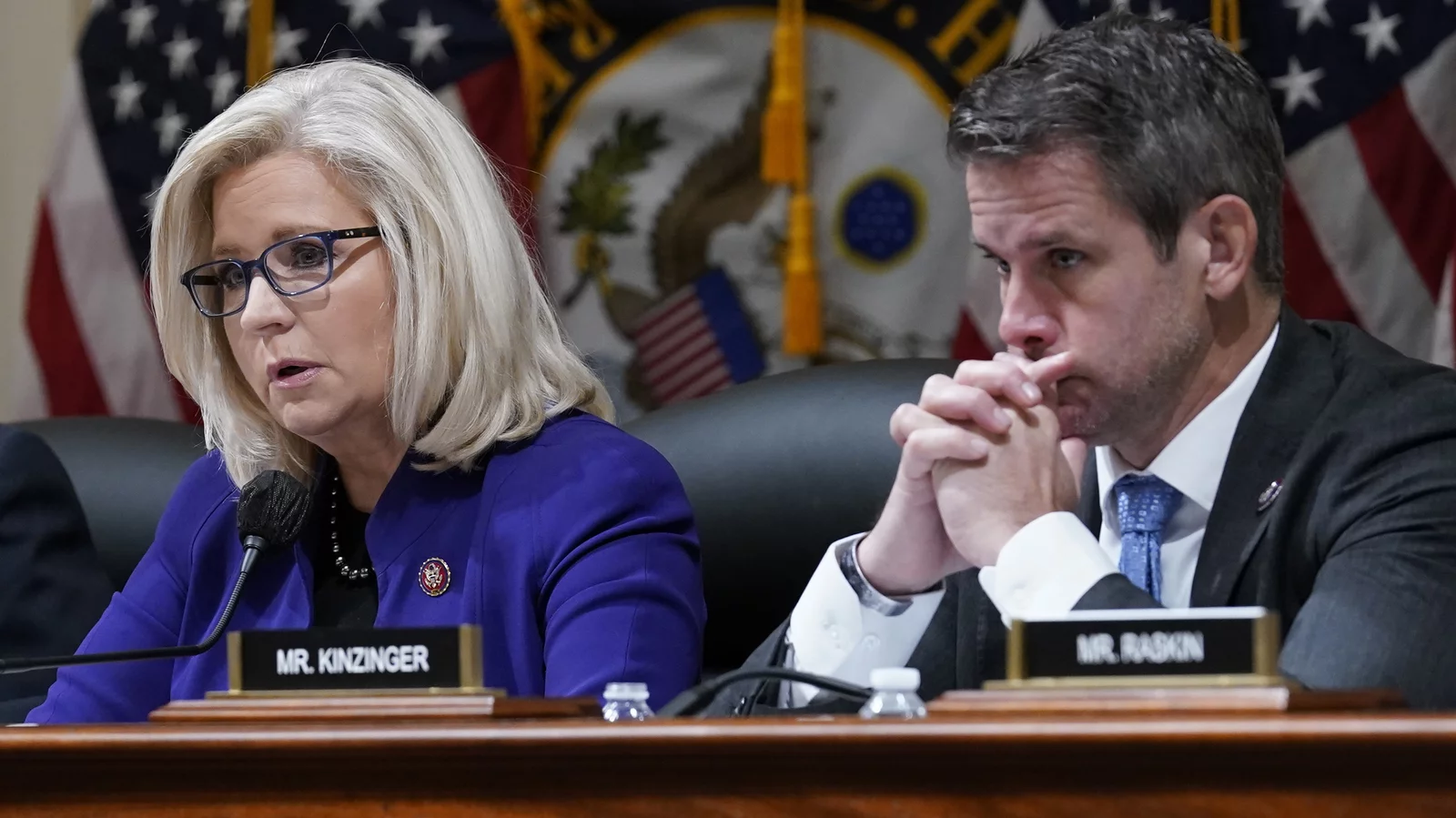
Leaders spreading disinformation to citizens is so undemocratic that it's completely counter to the ideas of the Enlightenment, which the US constitution is grounded in.
2.6 Political violence
the use of mass communications to incite random actors to carry out violent or terrorist acts that are statistically predictable but individually unpredictable. In short, remote-control murder by lone wolf.
Psychologist Valerie Terico explains that it's not a new phenomenon, and attributes the murders of abortion providers as early as 1993 to this technique. She writes
In an incident of stochastic terrorism, the person who pulls the trigger gets the blame. He— I use the male pronoun deliberately because the triggerman is almost always male— may go to jail or even be killed during his act of violence. Meanwhile, the person or persons who have triggered the triggerman, in other words, the actual stochastic terrorists, often go free, protected by plausible deniability. The formula is perversely brilliant:
- A public figure with access to the airwaves or pulpit demonizes a person or group of persons.
- With repetition, the targeted person or group is gradually dehumanized, depicted as loathsome and dangerous—arousing a combustible combination of fear and moral disgust.
- Violent images and metaphors, jokes about violence, analogies to past “purges” against reviled groups, use of righteous religious language—all of these typically stop just short of an explicit call to arms.
- When violence erupts, the public figures who have incited the violence condemn it—claiming no one could possibly have foreseen the “tragedy.”
2.6.1 Motivation
There are two potential reasons that Republicans are inciting stochastic terrorism.
The first is to instill a desire among the general population for more "law and order." One of the purposes of government is to maintain order so people can go about their lives. If people feel that their world is out of control, they will seek to put into power a group that they perceive will maintain order. Once a group is in power, citizens will let it enact and enforce increasingly restrictive (undemocratic) laws and practices to maintain order.
The second reason is to discourage people from resisting the rise of authoritarian rule. For example, during the March on Rome, Mussolini was able to enter Rome and was given control ahead of the blackshirts because of the threat of violence.
Republicans want the rest of us — the majority — to live in constant fear of their violent, heavily-armed, racist followers. From encouraging them to brandish their assault weapons in public to allowing anyone to carry an instrument whose only purpose is to kill people. See that angry dude in the MAGA hat? See him ranting and raving at some innocent BIPOC who just wants to live their life? I’m going to think twice before I jump up to support my fellow human, because that MAGA guy is likely armed and will get away with murdering me, because reasons. Maybe I’m considering volunteering to work an election. But then I remember my neighbor who was doxxed by MAGA terriorists and had to flee for her safety because they were showing up to stand around outside her house with their guns.
2.6.2 Demonization
Republicans regularly demonize their standard scapegoats.
2.6.2.1 Replacement theory
A prime example of this scapegoating is the "Great Replacement Theory." According to The Jewish Chronicle
The essence of the theory is that white citizens in Western countries are being replaced by ethnic minority people to the detriment of the societies and in some cases, entrench support for one political party over another.
In many readings of the theory, Jewish 'elites' are attempting to hasten this process and are directing governments to pursue policies that undermine the control of white people over countries.
Republicans are killing two birds with one stone by demonizing both Jews and ethnic minorities in one conspiracy.
In fact, the Republicans are correct about one part: white people are projected to become a minority of the total population in 2045, due to long-term demographic shifts. The conspiracy theory is that this is anyone's intentional plan. If you're a white supremacist and you believe the conspiracy theory, then you would see Jews and other minorities as an existential threat to your culture and power.

A sampling of Republicans promoting the replacement theory include:
Tucker Carlson. In April 2021 he said on his FOX News show
“I know that the left and all the little gatekeepers on Twitter become literally hysterical if you use the term 'replacement.' If you suggest that the Democratic Party is trying to replace the current electorate — the voters now casting ballots — with new people, more obedient voters from the Third World, but they become hysterical because that's what's happening, actually. Let's just say it. That's true.
- Jeanine Pirro. The FOX News host said in 2019, "Think about it. It is a plot to remake America, to replace American citizens with illegals that will vote for the Democrats."
- J.D. Vance. The senate candidate in Ohio said that Democrats "have decided that they can't win reelection in 2022 unless they bring in a large number of new voters to replace the voters that are already here."
- Blake Masters. The senate candidate in Arizona said “The Democrats want to change the demographics of this country. They think that if they can bring in millions and millions and millions of illegal aliens, someday they'll be able to grant them amnesty to grant them citizenship and make them reliable Democrat voters. I think it's an electoral plan."
- Eric Schmitt. Missouri's state Attorney General said Democrats are "fundamentally trying to change the country" through immigration.
- Mitch McConnell. When asked, the Senate Minority Leader declined to reject the concept of 'great replacement.'"
Elise Stefanik. The number 3 ranking Republican in the House ran a Facebook ad saying
“Radical Democrats are planning their most aggressive move yet: a PERMANENT ELECTION INSURRECTION,” reads one of the ads, which shows a reflection of migrants in sunglasses Biden is wearing. “Their plan to grant amnesty to 11 MILLION illegal immigrants will overthrow our current electorate and create a permanent liberal majority in Washington.”
- Ron Johnson. The Wisconsin senator said "This administration wants complete open borders. And you have to ask yourself, why? Is it [that] really they want to remake the demographics of America to ensure that they stay in power forever?"
- Wendy Rogers. The Arizona state senator said "We Americans who love this country are being replaced by people who do not love this country."
Whoever is spewing the Replacement Theory, it appears to be working. A poll conducted in April 2022 showed that 68% of Republicans and 48% of all respondents believe in the conspiracy theory.
2.6.2.2 Pedophilia
Republicans regularly accuse Democrats and the LGBTQ community of being pedophiles or "groomers."
The QAnon conspiracy theory is vast, complicated and ever changing, and its adherents are constantly folding new events and personalities into its master narrative. But the gist of it is that national Democrats, aided by Hollywood and a group of “global elites”, are running a massive ring devoted to the abduction, trafficking, torture, sexual abuse and cannibalization of children, all with the purpose of fulfilling the rituals of their Satanic faith. Donald Trump, according to this fantasy, is the only person willing and able to mount an attack against them.
The conspiracy theory began on 4chan, a digital cesspool of hate speech and conspiracy theorizing, and adherents derive their beliefs from the cryptic postings of Q, an anonymous commenter who they believe to be a highly credentialed member of the Trump administration who is assisting Donald Trump in his heroic fight against the Satanic pedophile Democrats.
[T]he QAnon assertion that Satanist Democrats are farming children underground in order to harvest and drink their blood harkens back to an even older conspiracy theory, the antisemitic blood libel, a medieval fiction that posited that Jewish people stole and murdered Christian children in order to use their blood to make matzah.
As of October 2020, half of Republicans thought that top Democrats were involved in child sex-trafficking.
Prof. Emily Johnson notes that "There is no better moral panic than a moral panic centered on potential harm to children."
2.6.2.3 Dangerous minorities
When various conspiracy theories get to be too much, the Republicans can always fall back on the tried and true accusations that minorities are dangerous.
As one example of many, during Trump's campaign for the 2016 election he said:
When Mexico sends its people, they're not sending their best. They're not sending you. They're not sending you. They're sending people that have lots of problems, and they're bringing those problems with us. They're bringing drugs. They're bringing crime. They're rapists. And some, I assume, are good people.
Malcolm Nance [p. 49] gives the example of Mark Nuckols who "apparently lives in an alternate universe where antifascists, Black Lives Matter, and Islamic jihadists, the three boogeymen for all extremists, join in a civil war against good, God-fearing white Americans." Nuckols wrote:
In similar fashion, I believe one likely spark for the Second American Civil War will be the result of a coup d’etat carried out by anti-America extremists. It will catch most Americans by surprise. The coup plotters will act quickly to seize the critical levers of power, before any opposition has a chance to react. And they will be aided and abetted by the kinds of people Lenin referred to, contemptuously, as useful idiots.
The shock troops will come from the ranks of Antifa and radical anti-white elements of the Black Lives Matter movement. These fascist stormtroopers will be augmented by the even larger numbers of veterans of Occupy and other far-left movements. And jihadists from across the globe will flock to support this coup. But the real power will be behind the scenes, in the hands of the bureaucrats of the American deep state, who will see such a far-left coup as their best chance to preserve and expand their far-reaching powers, but which President Trump threatens.
2.6.3 Stoking violence
In stochastic terrorism, after a targeted group of people is labeled as being a threat, violence is suggested.
2.6.3.1 Violent rhetoric
One way to stoke violence is to suggest it as being a reasonable and expected course of action. The trick is to suggest it indirectly enough to maintain "plausible deniability."
Juliette Kayyem, former assistant secretary at the Department of Homeland Security, notes:
We are stuck parsing Trump's words, forced into textualist debates about what he meant by 'LIBERATE MICHIGAN' or 'Stand Back and Stand By'.... Meanwhile his supporters know EXACTLY what he means.
Additional examples of this rhetoric includes:
- In the campaign for the 2016 election, Trump spoke ominously about Hilary Clinton nominating SCOTUS justices and other if she were to win: "If she gets to pick her judges, nothing you can do, folks. Although the Second Amendment people, maybe there is. I don't know."
- After DHS cybersecurity director Chris Krebs described the 2020 elections as the most secure in history, Trump campaign lawyer Joseph DiGenova said Krebs should be "taken out at dawn and shot."
- When electors in Arizona were preparing to certify Biden's win, Wendy Rogers, then state senator-elect, who backed Trump’s false claims about the election, said “Buy more ammo.”
- Steve Bannon called for beheading Dr. Fauci and FBI Director Wray.
- At campaign rallies, Trump spoke about immigrants heading north toward the US border and said "You look at what is marching up, that is an invasion! That is an invasion!" Fox News regularly warned viewers about the dangers of migrant caravans.
2.6.3.2 Revering violence
Kyle Rittenhouse, then a 17 year old from Illinois, traveled with an AR-15 to protests in Kenosha, Wisconsin that followed the shooting of a black man, Jacob Blake, by a white police officer. Rittenhouse killed two protestors who tried to grab his gun, claiming self defense. In a trial overseen by a judge who was so biased that the case drew laughter from observers, Rittenhouse was acquitted on all charges that the judge hadn't already dismissed.
After the acquittal, Rittenhouse met with Trump at one of his golf clubs and appeared at several events run by Turning Point USA, a conservative nonprofit. At one event, the Turning Point organizer Charlie Kirk said to Rittenhouse "You're a hero to millions, it's an honor to be able to have you," after which the crowd gave him a standing ovation.

Kyle Rittenhouse takes the stage at TPUSA’s AmericaFest to thousands of cheering fans chanting his name. He even gets his own Kyle Rittenhouse-themed song to come out to. pic.twitter.com/PD7nkjpQ81
— AZ Right Wing Watch (@az_rww) December 21, 2021
2.6.3.3 Laws promoting violence
During the gathering of white supremacists in Charlottesville, VA in 2017, one of the white supremacists drove his car into a crowd of counter-protestors, killing one. Subsequently, Oklahoma, Iowa, and Florida passed laws granting immunity to drivers who hit protesters, and eight states have similar bills pending.
2.6.3.4 Gun availability
Another way of encouraging violence indirectly is to flood the country with weapons. Republicans have opposed restrictions on gun ownership for decades, and as of December 2021 there were an estimated 436.4 million guns in the country, or about 1.3 guns per person. (About 1% of the guns are owned by law enforcement agencies or the military.) The average gun owner has 5 firearms.
Republicans have pushed the false interpretation of the Second Amendment that it allows the use of guns "to promote peace, prosperity, and liberty, both by protecting one's life and property from invaders and by lawfully resisting a tyrannical government." This interpretation ignores the "well regulated militia" clause of the amendment, and it wasn't even argued until 2008 that there's a private right of individuals to have arms for their own defense. Communicating to gun owners the sense that they have the right to use their guns to kill people in the name of defending their own "property" and "liberty" makes increases the chances of gun violence.

2.6.3.5 Violent imagery
A number of Republicans have released political ads and Christmas cards with guns, which normalizes their use.
I will NEVER give up my firearms. I will NEVER surrender my AR-15. If Democrats want to push an insane gun-grab, they can COME AND TAKE IT! pic.twitter.com/Yw6QVFqLg6
— Ronny Jackson (@RonnyJacksonTX) July 17, 2022
Make Rifles Great Again 💪🏿
— Jerone Davison for Congress #AZCD4 (@Jerone4Congress) July 6, 2022
👉https://t.co/J7lHnodhku#JeroneForCongress#2A #SelfDefense pic.twitter.com/Gs6iAHVVAP




My opponent says she’ll defend ‘democracy.’
— Abe Hamadeh for Arizona AG (@AbrahamHamadeh) September 3, 2022
Believe me Kris, you don’t know how. pic.twitter.com/SPZM9hvlbr
2.6.4 Resulting violence
Stochastic terrorism has worked successfully for the Republicans, resulting in right-wing violence.
Head of DOJ's National Security Division, Matt Olsen, tells Congress that DOJ has seen a growing threat from domestic violent extremists motivated by racism and those with anti-government ideologies.
— Ryan Lucas (@relucasz) July 28, 2022
"There is no doubt that these threats are on the rise," he says.
For example:
- In 2017, an Illinois militia group bombed a Minnesota mosque. The militia members said they "wanted to scare [Muslims] out of the country" because they push their beliefs on everyone else.
- In 2018, a Florida Man mailed inoperative pipe bombs to 13 prominent Democrats and media figures critical of President Trump. His lawyers said he was "motivated by his obsession with Trump and his anger at Democrats."
- In October 2018, a man
entered the Tree of Life Synagogue in Pittsburgh, PA and yelled “All Jews must die,” then opened fire upon the congregants. He was armed with an assault rifle and several handguns and killed eleven congregants and wounded six others.... [He] told an officer that... Jews “were committing genocide against his people.”
- In August 2019, a man killed 23 people and injured dozens more in a Walmart in El Paso, TX. He left a manifesto "railing against immigration and announcing that 'this attack is a response to the Hispanic invasion of Texas.'"
- In April 2020, two weeks after Trump tweeted that his followers should "LIBERATE MICHIGAN" from Covid restrictions, armed militia members entered the Michigan capitol building. Six months later, the FBI arrested members of the same militia on charges that they planned to kidnap Michigan Governor Gretchen Whitmer.
- In May 2022, an 18 year old from upstate New York drove for hours and then killed 10 Black people and injured three others with an AR-15 at a supermarket in Buffalo, NY. In his manifesto, he stated "that it was 4chan, a controversial online message board, where he was 'awakened' to the conspiracy theory that was the driving force behind his actions: the 'great replacement' theory."


No matter what you think of Alex Jones all he did was speak words.
— Rep. Marjorie Taylor Greene🇺🇸 (@RepMTG) October 12, 2022
He was not the one who pulled the trigger.
Were his words wrong and did he apologize? Yes.
That’s what freedom of speech is. Freedom to speak words.
Political persecution must end.https://t.co/3X81xOCS9j
2.7 Claims the U.S. is not a democracy
The claim that "the U.S. is a republic not a democracy" has long been a rallying cry on the right. For example, it was a chant at the 1964 Republican convention (where Goldwater became the G.O.P. nominee). However, there's been a sharp increase in this talking point by the right wing on social media and at rallies.
The problem is that the words "democracy" and "republic" have long been understood to be short-hand for more complex concepts, which is knowingly being ignored at rallies and social media posts.
Libertarian UCLA law professor Eugene Volokh wrote
I often hear people argue that the United States is a republic, not a democracy. But that’s a false dichotomy. A common definition of “republic” is, to quote the American Heritage Dictionary, “A political order in which the supreme power lies in a body of citizens who are entitled to vote for officers and representatives responsible to them” — we are that. A common definition of “democracy” is, “Government by the people, exercised either directly or through elected representatives” — we are that, too.
The United States is not a direct democracy, in the sense of a country in which laws (and other government decisions) are made predominantly by majority vote. Some lawmaking is done this way, on the state and local levels, but it’s only a tiny fraction of all lawmaking. But we are a representative democracy, which is a form of democracy.
And indeed the American form of government has been called a “democracy” by leading American statesmen and legal commentators from the Framing on. It’s true that some Framing-era commentators made arguments that distinguished “democracy” and “republic”; see, for instance, The Federalist (No. 10), though even that first draws the distinction between “pure democracy” and a “republic,” only later just saying “democracy.” But even in that era, “representative democracy” was understood as a form of democracy, alongside “pure democracy”: John Adams used the term “representative democracy” in 1794; so did Noah Webster in 1785; so did St. George Tucker in his 1803 edition of Blackstone; so did Thomas Jefferson in 1815. Tucker’s Blackstone likewise uses “democracy” to describe a representative democracy, even when the qualifier “representative” is omitted.
In other words, a republic is a type of democracy. The founding fathers used the term to differentiate our government from a direct democracy. Professor of political science George Thomas at Claremont McKenna College explains
When founding thinkers such as James Madison spoke of democracy, they were usually referring to direct democracy, what Madison frequently labeled “pure” democracy. Madison made the distinction between a republic and a direct democracy exquisitely clear in “Federalist No. 14”: “In a democracy, the people meet and exercise the government in person; in a republic, they assemble and administer it by their representatives and agents. A democracy, consequently, will be confined to a small spot. A republic may be extended over a large region.” Both a democracy and a republic were popular forms of government: Each drew its legitimacy from the people and depended on rule by the people. The crucial difference was that a republic relied on representation, while in a “pure” democracy, the people represented themselves.

We aren’t a democracy. Why do I keep hearing everyone say that? We have never been a democracy, and as long as we have the constitution, will never be a democracy. Our founding fathers did everything possible to make sure this country never becomes a democracy.
— Aaron Thibeaux (@thibeaux_aaron) September 2, 2022
Some who claim "America is not a democracy" actually do understand that America is a democracy. For example, Utah Senator Mike Lee tweeted this phrase. He later wrote
Insofar as “democracy” means “a political system in which government derives its powers from the consent of the governed,” then of course that accurately describes our system. But the word conjures far more than that. It is often used to describe rule by majority, the view that it is the prerogative of government to reflexively carry out the will of the majority of its citizens. Our system of government is best described as a constitutional republic. Power is not found in mere majorities, but in carefully balanced power.
I doubt that many of the thousands of people who read his tweet bothered to read his fuller explanation on the website of First Things, "America's most influential journal of religion and public life."
The word “democracy” appears nowhere in the Constitution, perhaps because our form of government is not a democracy. It’s a constitutional republic. To me it matters. It should matter to anyone who worries about the excessive accumulation of power in the hands of the few.
— Mike Lee (@SenMikeLee) October 8, 2020
It also doesn't matter to the Arizona Republicans who are telling this to crowds. Robert Draper of the New York Times quoted Selina Bliss, candidate for the Arizona State House, speaking to a recent political gathering
We are a constitutional republic. We are not a democracy. Nowhere in the Constitution does it use the word ‘democracy.’ When I hear the word ‘democracy,’ I think of the democracy of the Democratic Republic of the Congo. That’s not us.
Draper goes on to report
Throughout Arizona’s 2022 political season, the proactive denigration of democracy among Republicans became a chorus that was impossible to ignore in meetings, speeches and rallies across the state. “By the way,” Charlie Kirk made a point of saying at the fund-raiser in Goodyear, “we don’t have a democracy. OK? Just to fact check. We’re a republic.” At a gathering in Mesa that I attended in July, held by the conservative group United Patriots AZ, the evening’s host, Jeffrey Crane, asked the audience, “Are we a democracy?” They responded loudly: “Nooooo! Republic!” In each case, the very notion of democracy was raised not so much to win a scholarly point but rather to shine a spotlight on it as an offending object.
The founding fathers created a republic, or representative democracy, with the goal of enforcing checks on the will of the majority. Jay Cost of the conservative National Review wrote on the website of the conservative American Enterprise Institute that the founding fathers'
primary method of doing this was the separation of power across three branches of government. The public retains control over each branch, but the link between the people and each branch is conditioned by different factors. The House remains the most sensitive to public opinion, with representatives directly elected by the people to two-year terms. The president and Senate were originally intended to be less sensitive, with longer terms and mediating institutions (the Electoral College and state legislatures, respectively). Now, they are much closer to the public — with the Electoral College having become a nugatory pass-through for state plebiscites, and the Senate being directly elected by the people since the ratification of the 17th Amendment in 1913. The courts were to be the most immune of the branches to public opinion on a day-to-day basis, but, importantly, their composition and jurisdiction were to be determined by Congress and the president. And as an additional protection, a federal system was created whereby the national government possessed only enumerated powers, with the remainder of governing authority being explicitly retained by the states.
It appears to me that the Republicans are laying the groundwork to justify having state legislatures choose federal representatives. This is the system that Republicans may be aiming for by arguing for the Independent State Legislature theory, allowing state legislatures to appoint presidential electors.
There is also movement in conservative circles to repeal the 17th amendment, which would return the election of US senators from popular election back to state legislatures. As of 2018, that would have given Republicans 64 senate seats, rather than the 51 seats they won through elections.
While country's founders would have found it abhorrent to hear anyone using the term "republic" to deny that the US is a representative democracy, the framers did write the constitution to allow for disproportionate voting power as a compromise to bring all of the states into the new federal government. For example, representation in the senate is extremely disproportionate to population and the electoral college is somewhat disproportionate. (I would argue that the constitution did not create a true democracy for this and other reasons.)
However, due to the demographics at the time the constitution was written, the disproportionate voting power did not result in minority rule, nor did the framers envision that happening. It wasn't until the past few decades that Americans increasingly moved into politically homogeneous regions in "The Big Sort," that this disproportionate power combined with gerrymandering of election districts gave rise to the potential for sustained minority rule.
2.8 Expert testimony
A number of experts have stated that we should be concerned that Republicans are seeking to take control of America with an authoritarian government.
2.8.1 Government officials
J. Michael Luttig, conservative federal judge appointed by George H.W. Bush:
Trump and his allies are a clear and present danger to American democracy.”
Joe Walsh, former Republican congressman and a leading Tea Party conservative who rose to prominence in part by being a very vocal enemy of Barack Obama:
[M]y former political party is now fully radicalized and fully anti-democracy. Trumpism has metastasized beyond Trump. Trumpism is the denial of truth, the giving up on democracy, the embrace of authoritarianism, and the attempt to kill or destroy your political opponents. That's where today's GOP is. All because of Trump. How do I know this? Because for the past few years, I have spoken with hundreds of GOP base voters every single day. This is what they've told me.
Paul Tonko, Democractic congressman from New York:
For the Committee’s first hearing in June, I joined some of my colleagues who were trapped with me in the House gallery on January 6th to attend in person.... Seeing the venom and hatred in the eyes of the mob as they waved their “Trump 2020” flags, the shattered windows and broken-down doors, and the fear in the voices of our brave Capitol Police officers as they tried to hold the line reinforced just how close our democracy came to falling that day.... [The] powerful testimony has made clear that the threat to our democracy has not faded.... Until we both hold them accountable for January 6th and take measures to prevent another insurrection, our Republic remains at risk.
Robert Reich, Secretary of Labor under Bill Clinton
Since Ronald Reagan became president, I’ve watched the Republican Party turn from a governing institution into a crazed cult. It is not just bent on returning America to what it was before the New Deal. It is now intent on turning America into an authoritarian nation. It represents a clear and present danger to the future of the United States and the world.
On January 6, 2022, Joe Biden said
[N]ow it’s up to all of us — to we the people — to stand for the rule of law, to preserve the flame of democracy, to keep the promise of America alive.
That promise is at risk, targeted by the forces that value brute strength over the sanctity of democracy, fear over hope, personal gain over public good....
Make no mistake about it: We’re living at an inflection point in history.
Both at home and abroad, we’re engaged anew in a struggle between democracy and autocracy, between the aspirations of the many and the greed of the few, between the people’s right of self-determination and self- — the self-seeking autocrat....
They want to rule or they will ruin — ruin what our country fought for at Lexington and Concord; at Gettysburg; at Omaha Beach; Seneca Falls; Selma, Ala. What — and what we were fighting for: the right to vote, the right to govern ourselves, the right to determine our own destiny....
This is not a land of kings or dictators or autocrats. We’re a nation of laws; of order, not chaos; of peace, not violence.
Here in America, the people rule through the ballot, and their will prevails.
So, let us remember: Together, we’re one nation, under God, indivisible; that today, tomorrow, and forever, at our best, we are the United States of America.
On August 25, 2022 Joe Biden said
Your right to vote is on the ballot [this year]. Even…democracy.
The MAGA Republicans don’t just threaten our personal rights and economic security,” he said. “They’re a threat to our very democracy. They refuse to accept the will of the people. They embrace…political violence. They don’t believe in democracy.
Liz Cheney (R-WY) after losing the primary on August 16, 2022
Two years ago, I won this primary with 73 percent of the votes. I could easily have done the same again, the path was clear, but it would have required that I go along with President Trump’s lie about the 2020 election. It would have required that I enable his ongoing efforts to unravel a democratic system and attack the foundations of our Republic. That was a path I could not and would not take.
The struggle of our time isn’t Left versus Right, Democrats versus Republicans.
— Robert Reich (@RBReich) July 2, 2022
It’s about democracy versus authoritarianism.
Here’s the hard truth: The Republican Party voter base is now fully radicalized. They no longer believe in truth, they’ve given up on democracy, & they embrace authoritarianism. Many of us helped to radicalize these voters. For that I’m sorry. Our only job now is to defeat them.
— Joe Walsh (@WalshFreedom) September 2, 2022
2.8.2 Professors
Heather Cox Richardson, professor of history at Boston College:
The current-day Republican Party has abandoned the idea of a democracy in which a majority of the people elect their government. Instead, its members have embraced minority rule....
The Dobbs decision marks the end of an era: the period in American history stretching from 1933 to 1981, the era in which the U.S. government worked to promote democracy. It tried to level the economic playing field between the rich and the poor by regulating business and working conditions. It provided a basic social safety net through programs like Social Security and Medicare and, later, through food and housing security programs. It promoted infrastructure like electricity and highways, and clean air and water, to try to maintain a basic standard of living for Americans. And it protected civil rights by using the Fourteenth Amendment, added to the U.S. Constitution in 1868, to stop states from denying their citizens the equal protection of the laws.
Now the Republicans are engaged in the process of dismantling that government. For forty years, the current Republican Party has worked to slash business regulations and the taxes that support social welfare programs, to privatize infrastructure projects, and to end the federal protection of civil rights by arguing for judicial “originalism” that claims to honor the original version of the Constitution rather than permitting the courts to protect rights through the Fourteenth Amendment.
But most Americans actually like the government to hold the economic and social playing field level. So, to win elections, Republicans since 1986 have suppressed votes, flooded the media with propaganda attacking those who like government action as dangerous socialists, gerrymandered congressional districts, abused the Senate filibuster to stop all Democratic legislation, and finally, when repeated losses in the popular vote made it clear their extremist ideology would never again command a majority, stacked the Supreme Court....
In its imposition of minority rule first by insisting on state’s rights and then by demanding federal protection of laws it wants, the Republican Party is echoing the southern Democrats before the Civil War. Like today’s Republicans, as they lost support they entrenched themselves first in the machinery of the federal government and then in the Supreme Court.
And, finally, when northerners realized that enslavers had gamed the system to spread slavery across the nation, they came together from all different parties to protest and to stand against that attempt to destroy democracy and hand the country over to a few rich men. Ironically, that was the birth of the Republican Party that, under Abraham Lincoln, worked to create a government “of the people, by the people, [and] for the people.”
Ruth Ben-Ghiat, history professor and expert on fascism at New York University.
the fact that this was a multi-pronged effort that stretched back months to overturn democracy — and January 6th was the climactic point, that is coming out very clearly....
When you have a major party, and we only have two parties in this country, two major parties, and one of them is still unrepentant about what happened — if you study coups, you would look at that and say, "Well, okay, they may try again." Because one of the lessons of the history of coups is that failed coups are a lesson or a learning experience for the next coup. And it's very common to have a series of coups, and they can look different.
the lesson of these things is that we should never think it can't happen here. In many countries that had coups and had authoritarian takeovers, their societies also thought it couldn't happen there. And then it did....
This is part of the GOP becoming an authoritarian party. It is like a far-right party with an authoritarian culture. And one of the biggest signs, that's very sad, is that when you go in this direction you eat your own. There's no longer any dissent able to be had within the Republican Party. And Exhibit A of that is look what happened to Mike Pence. I am absolutely haunted by the fact that people were trying to kill Pence and that Trump said that he deserved to hang. This kind of party, authoritarian discipline, where you follow the leader or you deserve to die, that's not democracy. That has nothing to do with democracy. So the challenge in the coming time will be that one of our two parties is really exited from democracy and right now it's following the rules of authoritarianism. I don't know where this is gonna take us, but it's not a very good place for a country to be.
Stanford professor Cécile Alduy, who studies French politics and the far right says of a Republican win in 2024
My bet is that there is an active plan to reshape the political system so that elections are not winnable by Democrats, and the state be run without the foundation of a democracy.
2.8.3 Others
Malcolm Nance is a former United States Navy Senior Chief Petty Officer specializing in naval cryptology. He is an author and a pundit on national media programs. He said
This November [2020] is an existential crisis. We lose this election in November and it's done. I'm not going to sugar coat it. I'm not here to make you happy. I'm not here as a Democrat. I'm here as an intelligence professional to tell you what I talk about with my peers oversees. They understand that this could be the end of where the Republicans cease governing 100% and then use the laws to hammer each and every one of you, prosecute all of the people in Congress they find are enemies. You think this is not possible? It's on the way.
Tom Hogan was a lecturer in Holocaust and genocide studies at Santa Clara University and UC Santa Cruz and then a Silicon Valley marketing executive. Now he is an author and contributes to Newsweek, The Jerusalem Post and The Bulwark. He writes
Academics have drawn various historical parallels to today’s divided and contentious America. Some hark back to 1968—the assassinations, Viet Nam, the Chicago convention, the Moral Majority vs. the New Left. Others go back to the period leading up to the Civil War. I believe the more accurate analogy is with Germany in the early ’30s.
In my seminars on genocide and the Holocaust, I taught students that genocide is like cancer: You have to recognize it in its earliest forms and treat it aggressively. By the time you reach the point of concentration camps or gas chambers, it’s too late. While we are nowhere near that point, the trends are worrying.
Our liberal democracy is in danger. And unfortunately, no one— not the Biden administration, not Congress, not the Democratic party, not the majority of Americans— seems capable of taking the actions needed to protect it. An entire year has gone by since the attack of January 6th, allowing a penchant for totalitarianism to metastasize in a sizable segment of our population. We can’t let another year go by without acting to protect our democracy.
2.9 Not just Trump
Much of the evidence of impending authoritarianism discussed in this section centered on Trump. However, even if Trump were to be, say, incarcerated at Georgia State Prison, eating nutraloaf and shuffling around the exercise yard in a white jumpsuit with "Dept. of Corrections" on the back, the threat of authoritarianism would not be diminished. The problem started decades ago, and will continue after Trump. As Barack Obama said
I'm not surprised that somebody like Trump could get traction in our political life. He's a symptom as much as an accelerant. But if we were going to have a right-wing populist in this country, I would have expected somebody a little more appealing.
- Trump is a symptom and accelerant of the authoritarian problem, not its cause.
- Polls of the Republican base show that right-wing Americans are much more in favor of authoritarianism than those in other advanced democracies. This is corroborated by the fact that more people voted for Trump in 2020 than in 2016, even after his near-constant attack on democracy over the previous four years.
- There's almost no one left in the Republican Party at the national level in favor of democratic practices. Not in the House, Senate, or Republican National Committee. The vast majority of candidates running in the 2022 midterms deny the results of the 2020 election results without evidence.
- Even if Trump were not to run again, the likely Republican candidate, Ron DeSantis, has been employing similar authoritarian practices in Florida.
2.9.1 Republican base
The long and the short of it is that a huge number of Americans support authoritarianism.
Bob Altemeyer was a Professor of Psychology at the University of Manitoba where he produced the right-wing authoritarianism (RWA) scale in 1981 as an improvement on the earlier fascism scale. It measures "a personality type that describes somebody who is highly submissive to their authority figures, acts aggressively in the name of said authorities, and is conformist in thought and behavior."
RWA is scored from a low of 20 to a high of 180. Those scoring between 111 and 180 points are considered "high RWA," while those scoring 20 to 63 are considered "low RWA."
Working with the Prof. Altemeyer, Monmouth University conducted polling in 2019 and 2021 to assess the RWA tendencies of Americans. Monmouth found that poll respondents who identified as Republican had an average score of 115 ("high RWA"), while those who identified as Democrats had an average score of 53 ("low RWA"). Just because this bears repeating, the average Republican has high authoritarian tendencies, based on responding positively to a number of questions like "Our country desperately needs a mighty leader who will do what has to be done to destroy the radical new ways and sinfulness that are ruining us."
Monmouth also found authoritarianism to be more prevalent in the US than other advanced democracies. The poll showed that 26% of all American adults have "high RWA" tendencies, which is twice as high as the two countries tied for second place, Italy and Australia. This means that 67 million American adults have high authoritarian tendencies.
In 2021, Morning Consult sponsored additional polling that found that not only did the American adult population as a whole score higher on the RWA scale compared with other advanced democracies, but also that right-leaning Americans had a higher RWA score than right-wing citizens of those other advanced democracies.

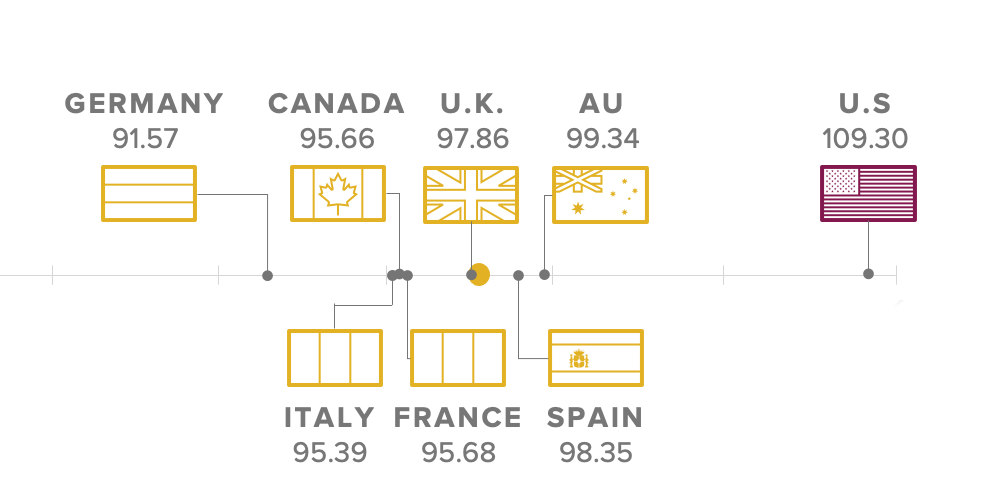
It's a cult. pic.twitter.com/A7FnxpgnIu
— Really American 🇺🇸 (@ReallyAmerican1) September 24, 2022
In the end, the biggest indicator that the Republican base supports authoritarianism is that after four years of Trump in office- after all the lies, the constant chaos, the kissing up to authoritarians around the worlds and shunning of our allies, the disastrous response to COVID, the constant attacks on minorities, the uncountable abuses of power, our inability to distinguish if any action he took was for his benefit or the country's, the complete shit show from beginning to end- almost seven million more people voted for him in 2020 than in 2016. Every single one of those voters saw his dictatorial ambitions and said "that's for me."
2.9.2 Republican leadership
There's almost no one left in the Republican Party at the national level in favor of democratic practices. Not in the House, Senate, or Republican National Committee.
The Republican National Committee doesn't even have a platform anymore. At their last national convention in 2020, their only stated value was that they "unanimously agreed to reassert the Party’s strong support for President Donald Trump and his Administration."
The few democracy-supporting Republicans who are left are actively being pushed out. For example, of the 10 House Republicans who voted to impeach Trump for inciting the January 6 insurrection, only 2 will even be on the ballot for reelection in November 2022. After Liz Cheney (R-WY) lost her primary in August 2022 because of her participation in the House January 6 hearings, The Lincoln Project noted
Tonight, the nation marks the end of the Republican Party. What remains shares the name and branding of the traditional GOP, but is in fact an authoritarian nationalist cult dedicated only to Donald Trump.
I agree. And I was the CIA Director https://t.co/LRAHDDyy4n
— Gen Michael Hayden (@GenMhayden) August 17, 2022
Eric: “Last night, my father killed another political dynasty, and that’s the Cheneys. He first killed the Bushes, then he killed the Clintons.” pic.twitter.com/3hB7sUykCz
— Ron Filipkowski 🇺🇦 (@RonFilipkowski) August 18, 2022
The #CPAC stage is designed to be a rune used by the Nazis. Curious if @Hyatt is okay with Nazi symbols being used on their properties like this? pic.twitter.com/D0332vKKoN
— Morgan J. Freeman (@mjfree) February 27, 2021
"Democracy cannot survive when one side believes there are only two outcomes to an election: either they win or they were cheated. And that’s where MAGA Republicans are today." -- @POTUS
— The Lincoln Project (@ProjectLincoln) September 24, 2022
On August 25, 2022, Joe Biden told supporters
What we’re seeing now is either the beginning or the death knell of an extreme MAGA philosophy. It’s not just Trump, it’s the entire philosophy that underpins the – I’m going to say something: It’s like semi-fascism.
An important component of democracy is the peaceful transition of power. A tactic used by authoritarian rulers, is to deny that they lost an election. A few examples are
- Robert Mugabe of Zimbabwe
- Nicolás Maduro of Venezuela
- Slobodan Milosevic of Serbia
- Laurent Gbagbo of Ivory Coast
According to the New York Times, "A 2018 study, based on elections around the world since 1950, found that only 12 percent of dictators who submit to elections and lose at the polls leave office peacefully."
In the weeks before the 2022 midterm elections, the New York Times found that
More than 370 people — a vast majority of Republicans running for [the U.S. House and Senate, and the state offices of governor, secretary of state and attorney general] — have questioned and, at times, outright denied the results of the 2020 election despite overwhelming evidence to the contrary.
Kari Lake, Republican candidate for Arizona governor said ahead of the 2022 election that she will only accept the election results if she wins.
2.9.3 Other presidential candidates
Political commentator Leigh McGowan noted
This plan that [Republicans] have underway doesn't even really need Trump to be implemented. In many ways the way the Republican Party is behaving right now- stripping voting rights, protesting rights women's rights, gay rights, civil rights- the plan Trump has for the second term is kind of the same plan for any potential Republican leader at this point- if it's a DeSantis, if it's Tucker Carlson himself- because the party is clearly on board for abandoning democracy for some form of authoritarianism. They know they can't win in a democratic world anymore, so they're moving on.
If Trump were unavailable to run for president in 2024 due to being, say, under house arrest at Seven Springs in Westchester, NY, or for health reasons, Ron DeSantis is next in line for the presidency. He's at least as much of a danger to democracy as Trump: he's following the authoritarian playbook in Florida, but in a more competent and strategic way than Trump is capable of.
He demonstrated is disdain for democracy in November 2020 when he "urged Pennsylvania and Michigan residents to call state lawmakers and urge them to intervene" by using the Independent State Legislature theory to overturn the results of the presidential election.
Trump has lost Alex Jones. He announces today he is off the Trump train: “I am supporting Desantis .. I can look into his eyes on HD video, and I see the real sincerity.” pic.twitter.com/wvpKq2PjQR
— Ron Filipkowski 🇺🇦 (@RonFilipkowski) August 18, 2022
On a smaller scale, Desantis has been able to get away with governing FL precisely the way Trump wanted to rule the country. There’s no one who will check him. As a president, he would embody all the dangers of Trump, without the incompetence, lack of discipline, or fecklessness.
— Ron Filipkowski 🇺🇦 (@RonFilipkowski) August 8, 2022
As noted earlier, authoritarian leaders includes the restriction of civil liberties including those of peaceful assembly. Thomas Edsall, writing in the New York Times, notes
On April 10, 2021, DeSantis signed the Combating Public Disorder Act into law, which his office described as “a robust approach to uphold the rule of law, to stand with those serving in law enforcement and enforce Florida’s zero tolerance policy for violent and disorderly assemblies.”
On Sept. 9, U.S. District Judge Mark Walker issued a 90-page opinion declaring that the law’s “vagueness permits those in power to weaponize its enforcement against any group who wishes to express any message that the government disapproves of” and that “the lawless actions of a few rogue individuals could effectively criminalize the protected speech of hundreds, if not thousands, of law-abiding Floridians.”
The next time someone tells you DeSantis is better than Trump because he poses no threat to democracy, remind them that DeSantis' administration approved 20 Floridians' voter registration—then arrested them for voting. Now they face five years in prison. https://t.co/yjIFijoE8G
— Mark Joseph Stern (@mjs_DC) August 30, 2022
Once authoritarians achieve power, they commonly remake the schools in order to indoctrinate children, and this has been a focus for DeSantis.
Contentious laws went into effect during the [2022] summer recess that restrict how schools teach topics linked to race and sexual orientation. New avenues were created for parents to sue teachers and challenge instructional materials. Math textbooks have been culled for traces of critical race theory. Schools for the first time will have to observe “Victims of Communism Day,” during which high schoolers will be taught anti-communism lessons.
According to Ana Ceballos of The Miami Herald:
If a parent feels that their child has been instructed to feel anguish or discomfort about a conversation related to their race or national origin in the context of what someone else did in the past, that could potentially trigger lawsuits and impact change throughout the school district.
During a new civics training for Florida public school teachers, the teachers were instructed that it's a “misconception” that “the Founders desired strict separation of church and state.”
Last year, Hungary passed a law banning sex education involving L.G.B.T.Q. topics in schools. Nine months later, in Florida, DeSantis signed a similar law, known as the “Don’t Say Gay” bill. DeSantis’s press secretary, talking about the inspiration for the law, reportedly said, “We were watching the Hungarians.”
FL civics teachers are speaking out after attending Desantis’s new mandatory 3-day ‘patriotic history’ indoctrination seminars. One example they cited was that students would be told Washington & Jefferson opposed slavery, while omitting the fact that they owned them. pic.twitter.com/2qtdTpJaAF
— Ron Filipkowski 🇺🇦 (@RonFilipkowski) August 4, 2022
Another authoritarian strategy is to exert control over businesses and business leaders so they don't interfere with his political machinations. The first step in taking control has traditionally been to make an example of one or a few businesses, so others fall in line. As historian Ruth Ben-Ghiat notes
DeSantis displays many traits of authoritarian-minded leaders, and one of the most disastrous is their insatiable appetite for power. This means that they persecute and harass increasing numbers of people as they strive to satisfy their desire to control everyone and everything.
Such individuals also love to engage in the autocrat game of “making an example” of people or entities that other politicians might not touch due to their size, influence or popularity. The point of this game is to show that no one is above being punished by them.
This is why, along with the usual GOP targets (the LBGTQ community, Blacks, and immigrants) we find DeSantis going after the Special Olympics. That’s not the move you make if you care about being seen as decent, but it’s the move you make if you want to be feared.
The logic of making an example also explains DeSantis’s attack on Disney, a family-friendly, job-creating giant, which was stripped of its self-governance status by the Florida legislature because the company spoke out against his so-called "Don't Say Gay" Bill, which limits K-3 classroom discussions of gender identity and sexual orientation and allows parents to potentially sue schools or teachers that engage these topics.
And it’s why DeSantis punished the popular Tampa Bay Rays for having the temerity to express sadness about the recent mass shooting of children in Texas–and for making a $50,000 donation to Everytown for Gun Safety’s Support fund. Opposing GOP gun rights policies earned the team a veto of their planned $35 million baseball complex.
According to Theda Skocpol, a political scientist and sociologist at Harvard, DeSantis
has obvious caudillo-like proclivities and would certainly do similar things to gut the federal Civil Service and turn security agencies into praetorian guards and election manipulators. He already has in Florida. I am not sure he would have as much capacity to cow the G.O.P. as a whole as Trump has proved to have, so his presidency might be more turbulent, and he might have a harder time assembling an authoritarian gang. However, the Steve Bannon-type networks will join him, and they have plans ready to go.
With DeSantis at the helm and most of the Republican base and leadership behind him, the U.S. would be just as at risk of authoritarianism as under Trump.
Copyright 2022 Jeremy Snyder. All rights reserved.
